#tl barbara
Photo
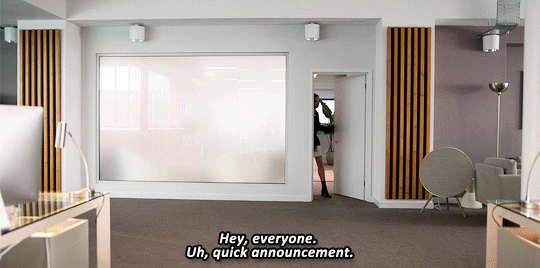
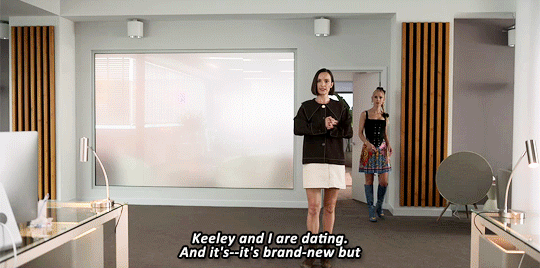
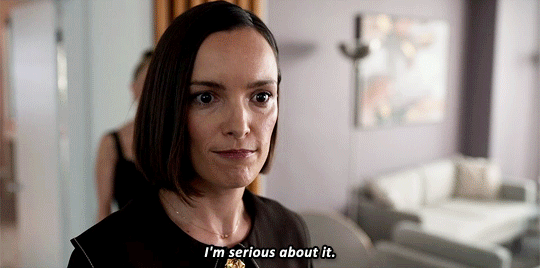
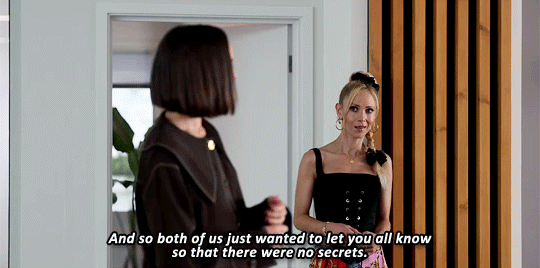
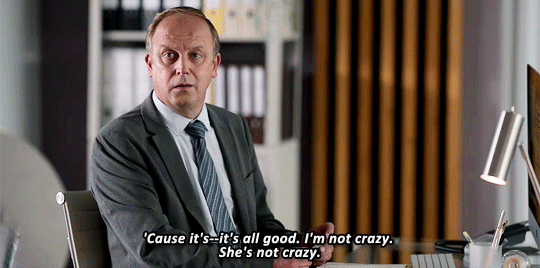






Ted Lasso - 3x07
Bonus:
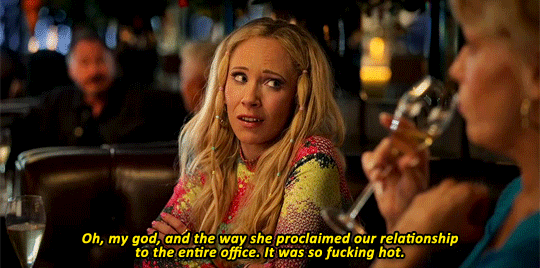
#tedlassoedit#ted lasso apple tv#jack danvers#keeley jones#tl barbara#tl dan#jodi balfour#juno temple#katy wix#darren strange#ted lasso 3x07#ted lasso spoilers#jack x keeley#femslash related stuff#it WAS hot#and I love how much it delighted keeley#when she realized what was going on#and jack's mild awkwardness covering up her nerves#''we're not crazy are you crazy?''#keeley's little eyebrow and smile at that :)))#and lmao dan#and aw barbaraaa
451 notes
·
View notes
Text
Three Jokers Are Not Better Than One
(or, cheap twists don't make a good story)

Would you look at that? It's time to bitch about Three Jokers!
(spoilers for a 3-year-old comic ahead)
Gotham War got me into hater mode, so I figured it was time to take a second look at Three Jokers, written by Geoff Johns and drawn by Jason Fabok. I first read it when the issues came out, and I thought it was possible that the story isn't as bad as I remembered. I don't know why, since for the past three years I've been haunted by the possibility of it being deemed canon.
Of course, at the time of conception, Three Jokers was intended to be canon. Johns set up the premise in the Darkseid War storyline of the 2011 Justice League run, in issues published in 2015/2016. Batman takes control of the omniscient Mobius Chair, and he tests it by asking who killed his parents. Then he asks a second question, which Hal Jordan presses him on several issues later.
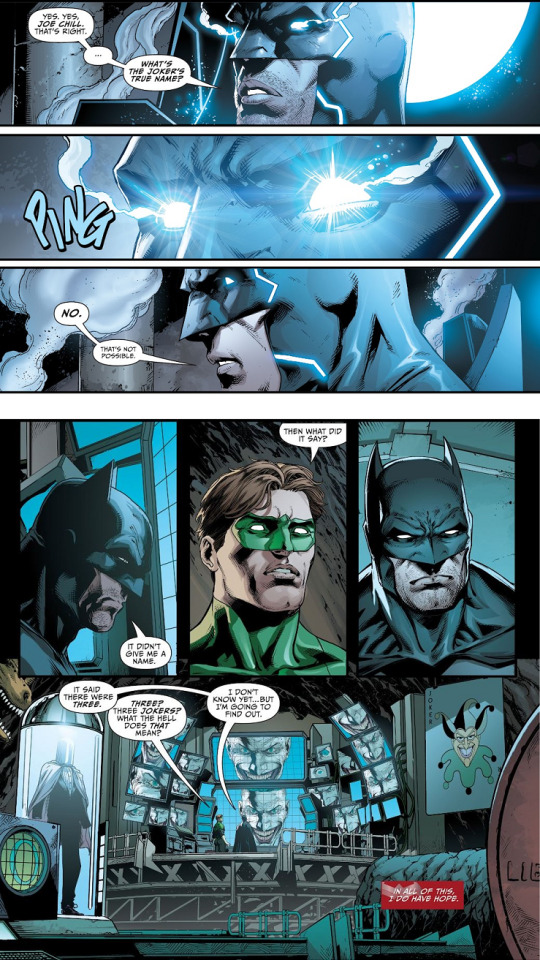
[Justice League (2011) #42 & Justice League (2011) #50]
Four years later, when Three Jokers was set to be released towards the end of 2020, Johns did at first confirm it would be canon despite being released via Black Label, where books are not meant to be part of the larger continuity. In later interviews, however, this assertion got walked back in favor of saying the canonicity is up to each reader, which is kind of a wild thing to say. "Look, this story merely proposes that one of our most popular characters has actually been three different dudes the whole time, which totally has a negligible impact on how that character should be seen and has interacted with the world. Take it or leave it!"
But then, DC's idea of canon has been pretty squiggly of late, especially with the increasing multiverse shenanigans. In the final issue of Dark Knights: Death Metal in 2021, the reader is told, "with our past finally set, myriad new futures are opening up. And as hypertime heals, we'll likely experience flashes of them– and even alternate pasts– in pretty epic fashion." Infinite Frontier followed, with a press release declaring, "When our heroes saved the Multiverse from Perpetua in Dark Nights: Death Metal, everything was put back where it belonged… and we do mean everything. All the damage from all the Crises was undone [....]"
I have a lot of thoughts about this, revolving around what the heck does it mean for storytelling and how we should understand characters that apparently, somehow, everything is canon? How are we supposed to take this as anything other than the omniverse being an excuse for DC Editorial to wave off responsibility for a legible timeline? "Batman can be in two places at once because, uh, the Monitor sneezed?"
But this too-long essay is about Three Jokers, so I'll narrow my concern: if character histories can simply change with a multiversal glitch, in whatever overwrought way those are usually explained to us, then it sure feels like it doesn't matter that Three Jokers was published under Black Label. It sure seems like, at whoever's whim, Three Jokers can still get locked into the main storyline. I mean, Zdarsky still hasn't explained what that three Jokers shit in Batman #135 is about. On the other hand, we know that the explanation for the two Jokers in The Man Who Stopped Laughing does not involve the multiverse, and Joker is supposed to reunite with Batman over in Zdarsky's story when that story closes out, so… I actually have no reason to be confident that means anything.
"But why would Three Jokers getting canonized be so bad?" you may ask if you've never read Three Jokers (or if you fully enjoyed it).
Speaking for myself, it starts with the premise: taking a character and saying, "actually, this is not one complex guy but three different guys, which fractures the character's motivations and relationships over the last several decades." When that character is one you enjoy very much, this twist is not fun. It's a fundamental change to who they are.
Then five months before the release of Three Jokers #1, Johns and Fabok did an interview with Entertainment Weekly. Some things the pair said raised red flags:
1) Three Jokers' story would focus on the trauma that Barbara, Jason, and Bruce suffered at Joker's hands, per Johns. "If you suffer some trauma, you don’t just get over with it and move on with your life, it changes who you are. Sometimes it changes you for the better, sometimes it changes you for the worse. You can heal right, and you can heal wrong. That’s really what the book’s about: Healing right, healing wrong, and surviving."
2) Johns also said of the story: “It goes back to the beginning when Batman first encountered the Joker, but it’s also The Killing Joke and A Death in the Family that speak to the book and that we’re building off emotionally." And Fabok mentioned that the book's look would be based on the aesthetics of The Killing Joke: "I really want it to feel like it could be a spiritual sequel, at least artistically."
These remarks foreshadowed a disconnect. A key part of The Killing Joke itself is that both Joker and Bruce experienced terrible trauma ("one bad day"), but in responding to it, they made different choices: broadly, Joker choosing to hurt people versus Bruce choosing to help people. Johns excluding Joker from his comments about trauma felt like a sign that he ignored a key part of the character, despite Joker being a core part of a new tale "emotionally" inspired by TKJ.
(We're setting aside "you can heal right and you can heal wrong" for now. Ohhh, we'll get back to that.)
Johns' blind spot was confirmed a few months later when he was quoted by the DC Nation Twitter account: "There are very few characters that are, to me, as irredeemable as The Joker. There is nothing in him that is good."
Wow, what close analysis from Mr. Emotional Build.
Look, I don't need Joker to be redeemed or woobified. (Ask me about the "Pushback" storyline from 2004 and hear my gnashing teeth crack a filling.) But I would like the full breadth of his character acknowledged, especially when you're claiming you're writing about trauma, especially when you're creating a "spiritual sequel" to one of best known Joker stories (if not the best known one).
Then Three Jokers finally came out, and over three months it proved to be neither an examination of healing nor very interesting, at least not in an enjoyable way. What it has to "say" about trauma, for any of the characters, is no different than the limited conclusion made in previous Batman books: mainly the drumbeat of fighting off the darkness by being a bigger person— or at least not killing your enemy. Making Joker into a role played by three different people adds nothing; it amounts to little more than a gimmick.
Hell, even as a gimmick, it's flawed. Theoretically, the three Jokers represent phases of personality the Joker has embodied over the years— but the representations we get don't make sense. Here they are summed up in Book 3:

Sorry, what? The Criminal is less interested in theatrics? In what time period was the Joker ever not interested in making a big show of things in one way or another? Maybe this is supposed to be an "early" Joker in terms of the Rebirth/InfiniCrisisDarkCarnateTier/whatever more recent conception of him, but I'll wager that's not what people think about when they think of Joker at his start. They think about Golden Age Joker doing goofy shit and laughing maniacally. They're not expecting this morose man.
The other thing is that, in Book 1, the narrative "assigns" each of our three protagonists to a Joker: Bruce to the Criminal, who appeared at the start; Barbara to the Comedian, who shot her; and Jason to the Clown, who killed him. Now at first I thought Johns was saying one Joker took over after another, but since Barbara's attack and Jason's death happened 9 months apart in 1988, which are not different Joker eras, I think we're supposed to see them as sort of… cycling on and off depending on the needs of the scheme? Maybe? But the descriptions above are still confusing. Why am I supposed to see the Joker who got carried away with the fun of beating Jason with a crowbar and successfully blew him up as less sadistic than the other one?
Johns does appear to lampshade this confusion in the middle of Book 1, when we get all three Jokers in a cabin in the woods. The Clown and the Comedian have this exchange:

This and a later panel with the Comedian actually imply that he and the Clown are interchangeable, even though they're supposed to be different. So are they or not? Is there an actual reason we need three Jokers, or did Johns just think it was a neato idea and then spend four years trying to figure out a "layered" justification for it?
The other thing about this cabin scene, and about the Joker trio largely, is that it should be fun and it's not. There should be chaos! Zaniness! At the very least, all the narcissism in the room should generate a competitive friction, make their interactions more dynamic. (Really it should generate bloodshed and end with one man standing within like ten minutes, but I'll grant the choice to save that for Book 3.) Instead it's almost mundane. The cabin isn't even decorated! It's dark and dreary, like the Jokers are dark and dreary. If we're gonna have three Jokers, can't they at least be Jokering with each other?
The same thought comes when I consider the very beginning of Book 1. It all starts out like a typical Batman story: three deadly crimes are committed in one night, the Joker seemingly responsible for all of them, and Bruce, Barbara, and Jason are drawn together as they try to figure out what's up. Of course, thanks to the Magic Chair, Bruce already knows there are three clowns, but Barbara and Jason are thinking that Joker is working with two look-alikes to create confusion. And considering the basics of what happens in this story, what the Comedian's larger plan is meant to accomplish, why couldn't this have been written with just two look-alikes? I mean, yeah, it would require Johns to forget about his continuity bomb, but maybe the story would have been better (and shorter). Again, the creation of other Jokers isn't doing much for what the plot is getting at. The three crimes that start us off would still serve the function of reminding Bruce of how Joker's been a constant in his life. The taunting of a convincing Joker look-alike is enough to set off Jason's anger and sadness about what happened to him, and his fears of what he could become. The climax with Joe Chill would have to be redone, but the threat of him being Jokerized isn't the crucial plot point; the Comedian's film of him is. Bruce doesn't even have any substantial thoughts about there being three of his nemesis.
But, alas, the story goes how it goes. And as it goes, we also see that Jason behaves more cruelly in his search for Joker than Barbara and Bruce. For example, Jason attacks and threatens one of Joker's victims to get information, feeling justified because the guy has a rap sheet, while Barbara scolds him and Bruce tells the victim, "I'm sorry this happened." What I find notable about this is that while comics regularly present Jason as hot-headed and Barbara as reasonable, Bruce… uh… If you gather a random selection of Batman comics, you'll find that his level of violence is all over the place. This story, however, requires a more somber Bruce, whose violence is more reactive, because Jason and Barbara serve Johns' dichotomy of "heal right" versus "heal wrong." We can't have Bruce on the sadistic side of the scale fucking that up, and besides, Jason's long been the posterboy for healing "wrong."
That notion comes to a head at the end of the issue. The heroes have encountered and subdued the Clown at the aquarium when Jim Gordon calls. The GCPD found another Joker, and Bruce leaves Jason and Barbara alone with the Clown to assist.

Goodness me, who could have predicted Jason might kill a restrained Joker? Not Bruce, who absolutely should have. Barbara is there to talk Jason down, sure, but what else is the Clown gonna do but needle Jason to kill him?

The Clown cackles then, declaring that Red Hood is his Robin, for the very reason of his violent impulses and how much he upsets the Bat, and of course Jason shoots him in the head, because oof.
Honestly, on this second read I found this scene a smidge too oof. Jason was a determined little Robin, dedicated to saving his awful mother to the very end, and him cracking and declaring that he'll work for a criminal… I don't know. I don't think it's impossible, but it feels superfluous. I don't think such a reveal is necessary to get Jason to fire. I think the Clown focusing on how the new Red Hood is actually quite similar to the old, as well as how Jason matters less than the neverending battle between Batman and Joker, is enough emotional stress to get to the same end result.
But that's a minor quibble; we've got bigger fish to fry! Such as the specter of the "healed right/healed wrong" dynamic that reappears as Barbara and Jason argue over the Clown's corpse.

Barbara leaves angrily after this, but man. I wish the story overall took more cues from this scene, that in a Black Label story we could stray from the simplistic idea of how a Good One would save Joker and a Bad One wouldn't. I want to explore Jason's assertion that Barbara didn't do her best to uphold Bruce's one rule. I want to know if maybe she's tired of being the fucking Good One.
Hell, let's go further: what if we were surprised by Barbara killing the Clown before Jason could? The Clown's taunting about Jason could have gotten to her too. We could have a story about how being put on a pedestal as a Good Victim is a cage, about Barbara struggling with falling from that position, about Jason feeling unsure if he should commend her for an act that obviously hurts her or comfort her for something he would have done himself. That's an actual examination of the struggle to process violent trauma— that you don't need three Jokers for!
But the story we have never gets back to Jason's suggestion that Barbara let the murder happen, not in this issue or the following two. This issue just ends with Jason hoping that the Clown was the actual Joker and that he didn't kill the wrong guy, which is a pretty "LOL oh yeah" line when you remember that he and Barbara don't know there are three Jokers yet.
Book 1, truth be told, isn't that bad. On my reread, I started to wonder if my only real issue with the story is that it's not as engaging as all the hype insisted it would be.
Then Book 2 starts, and goddammit. GODDAMMIT.
I've said it before, and I'll say it again: why can we not have more DC writers having fun with Joker's multiple-choice backstory? Why did Johns read The Killing Joke and decide his interpretation would be this?:
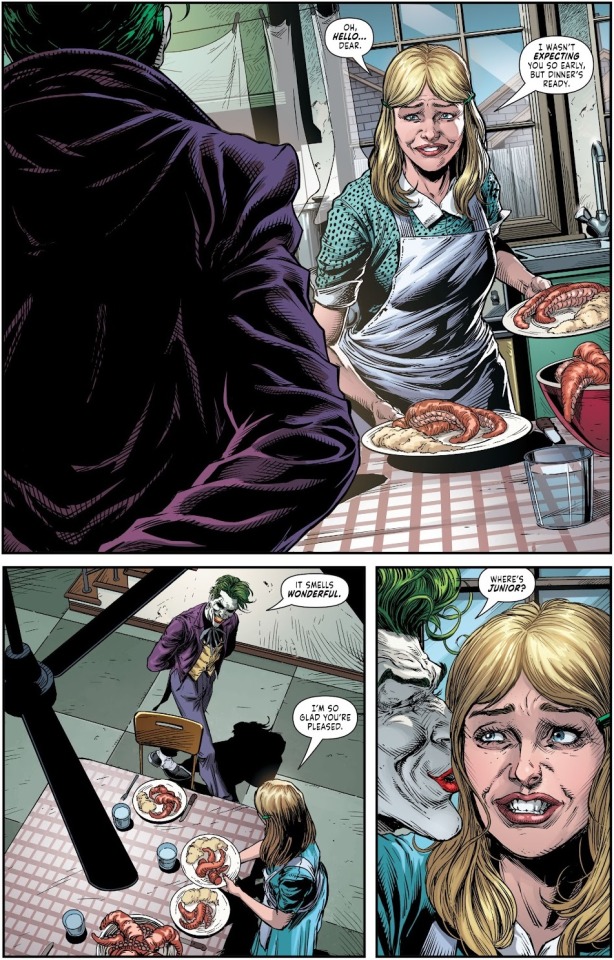
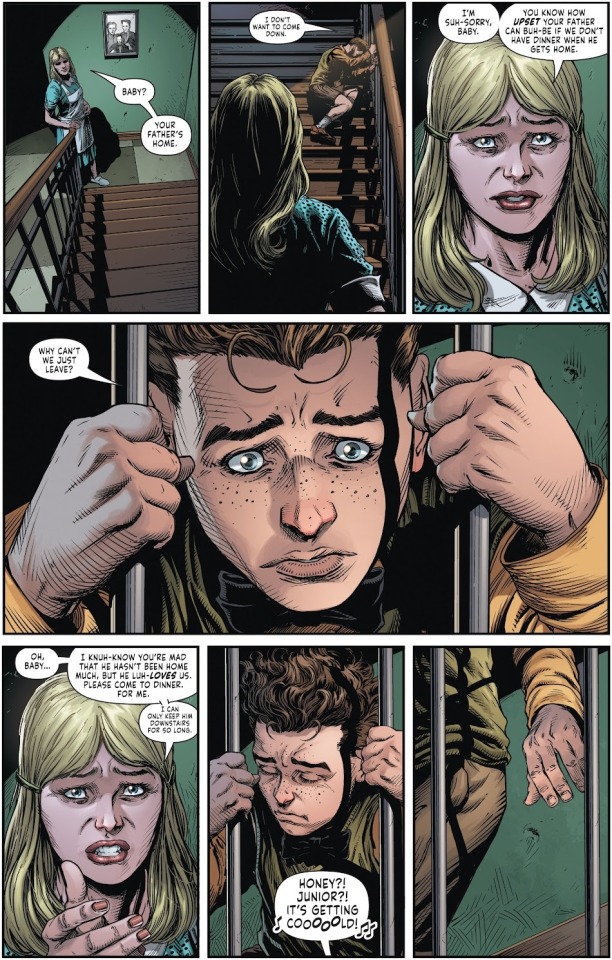
Ugh. UGGGHHH.
I don't recall the issue, but there's these panels that circulate sometimes of Harley Quinn encountering Joker in Arkham or prison, in which they exchange words about their relationship and he's a creep and she kicks his ass. I have no problem with Harley kicking Joker's ass. He deserves it. My problem is that those panels play out like an empowerment scene in a generic Lifetime movie. My problem is that it doesn't have the flavor of Harley and Joker. My problem is that it's lazy.
And that's my problem with what Johns does with Joker's backstory in TKJ. He could take it anywhere, and he goes gritty without an ounce of nuance. Because hey, this is Joker, and "there is nothing in him that is good," right? We'll just ignore that one of DC's all-time classics, the one this garbage is ✨inspired by✨, has Joker reflecting on a past for which he is an unreliable narrator, but in which he laments how his comedy dream put his growing family in a bad spot, in which he desperately aligns with shady people so his family can be secure, in which he's devastated by losing the only person he has in the world and their growing baby. And these memories could be distorted or entirely fake, but what's interesting in TKJ is that Joker never tells anyone else about them, even in his big speech to Batman. The flashbacks are not part of an attempt to manipulate anyone or convince them his world view is correct. It's a tale in Joker's head that, regardless of the truth, deeply affects him. It's what drove him to go to horrendous lengths to prove his point, even if the point is wrong.
But fuck that, right? We're going lazy! We're going cheap! We're going with the Jeannie backstory, but actually Joker was only terrible to her. The Comedian fondly fantasizes about terrorizing her and their son, because he's 100% an abuser, because he must have always been that way, with not a single appealing quality that we need to reckon with as we so often do with toxic people in real life. Even the freaking stutter Joker had as he struggled with stand-up comedy is given to Jeannie. Seriously?
I cannot emphasize enough: fuuuuuuuuuuuuuuck this "take."
On the other hand, when the Comedian is brought out of his stupor, we do finally get something super funny:

At least we'll always have this panel of Joker eating cat food.
The Criminal only interrupted the daydream because he's mad the Clown is dead, and the Clown was so eager to be dead I thought it was part of their plan buuuuuuut I guess not. Then we jump to Bruce figuring out that the "Joker" that Gordon cornered is just another victim, a dead judge. Barbara appears to tell Bruce what Jason did, and they discuss it over comms on the road.
Bruce, shockingly, says that they can't really do anything about what Jason did.
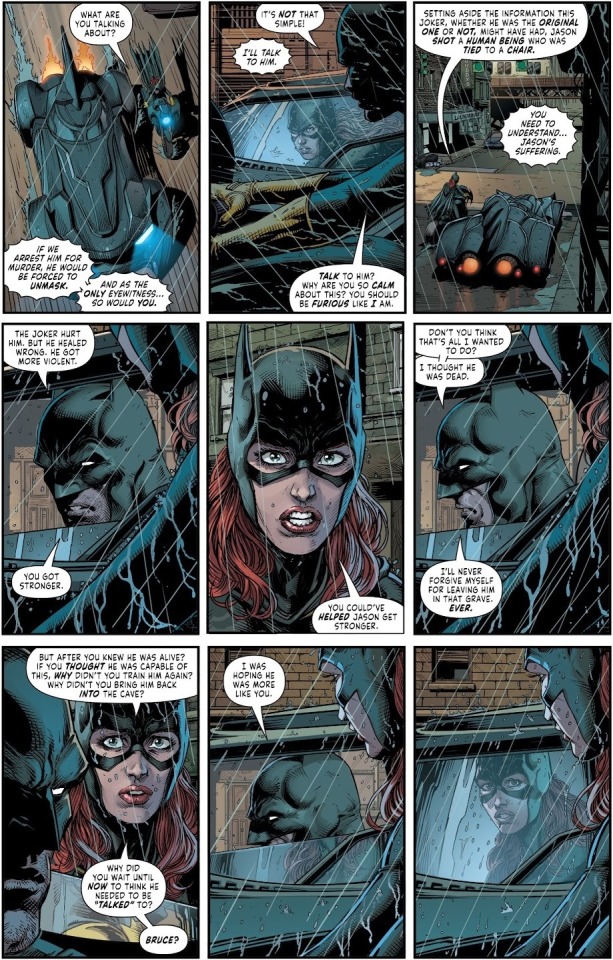
Pretty sure the guy who batarang'd Jason's throat rather than let him kill Joker would have a more intense reaction than this?? Or any reaction other than sober understanding? Maybe Bruce is still coping with finally dealing with three Jokers at once and will flip his shit when this all resolves. Or maybe he's just thinking, "it's okay, I still have two emotional support clowns left!" I don't know. He's so weirdly passive in this story.
What's more aggravating, though, is the other aspect of this conversation, that Jason "healed wrong." It would be one thing as a pat judgment Bruce is making, but we know from that interview that Johns positioned "healed right versus healed wrong" as the story's theme. It's not good. It's way too glib a framing for evaluating how people who've gone through trauma are dealing with it, in any context. Sure, there are better and worse coping mechanisms, better and worse outcomes, but healing is an ongoing process that can be so individualized. Reducing it to "right" and "wrong," saying that one is "strong" and implying that the other comes from some sort of deficiency… I hope Johns just spoke poorly and he does understand that it's not that simple.
Now, is it a stretch to apply that critique to Jason killing criminals at his whim? Sure, deciding that you personally should play the role of judge, jury, and executioner is not a good way to deal with trauma. But that's not exactly what's happening here. This "healed right versus healed wrong" framing is being applied to Jason Todd going after the Joker. Obviously, I like Joker, but can we be real about this? Can we be real in a Black Label book, the imprint where comic books (allegedly) have room to take things more seriously? Can we take the question of, "In this fictional world where Joker is an unstoppable fatal mayhem machine— now THREE machines— is it completely out of bounds for someone to finally kill him?" and be like, "Errr…not really?" When this story explicitly denies Joker even one teeny redeeming human quality, are we seriously still going to say, "Well, you know, if Jason takes the life of the man who murdered him and millions other people, because he doesn't want him to kill more people, which Joker will absolutely do and we all know it, doesn't that say something awful about Jason?" Are we really??
Plus the judgment about healing is put into the mouth of a man who— say it with me!— regularly dresses as a bat and beats the ever-loving shit out of people because his parents were murdered. Toning Bruce down in this particular story doesn't hide that.
Although, what I think is intended as a flawed assumption on Bruce's part is his other line, "Jason's suffering." It implies that Barbara still isn't, but we are shown Barbara reflecting on her paralyzation, even now when she's "strong" and has healed "right." And the story will get into this a bit later, but it absolutely does not let Barbara and Jason escape the dichotomy. To the story's detriment, their interactions go in a wild direction, but we'll get to that.
First, Bruce and Barbara's investigation leads them to Blackgate, because the fingerprints on the murder weapon for the dead judge belong to none other than Joe Chill. However, we learn that Chill has been in the medical wing for two months because he's sick with cancer.
Meanwhile, Jason's investigation leads him to a closed athletic center. The pool inside is filled with the chemicals stolen from Ace at the start of the story, as well as dozens of pale naked bodies with green hair. Jason's attempt to contact Barbara is interrupted when one of said bodies bursts to life and grabs his ankle, asking for help. Jason reacts with hostility, kicking the poor guy, and I'm not sure if it's because he's unnerved by a room of floating Jokers or if it's pretty normal for him to not keep his cool even for the sake of an obvious victim of a horrible crime. A Gotham City vigilante can't be that shocked by one guy being alive in a pile of bodies, can they?
But that's all setup. When the guy falls unconscious, the Criminal and the Comedian ambush Jason and drag him away, one saying, "He'll be perfect."
It's a line that meanly gets your hopes up, poking at a subject that could make all this more interesting.
Jason awakes, strapped to a chair and as naked as the bodies in the pool. The Criminal says he and his pals have spent a lot of time trying to find the perfect candidate for a new Joker, and he repeats the question of what's up with Jason taking on the Red Hood moniker.

It seems that, like DCAU Tim Drake in Batman Beyond before him, Jason Todd will be transformed into a fourth Joker! But it won't only be because it will wreck the Batman. It'll be because Joker already sees himself in Jason. This is something new to explore! There are places to go here; other comics hinting at Joker's past point to him having a childhood not dissimilar to Jason's, of growing up on the street, experiencing abuse, and learning unpalatable ways to survive. We could see Jason struggling with the possibility that he has more in common with Joker than he wants to think about!
But we won't. Inexplicably, the Criminal turns around and says that despite their similarities, despite Jason hating Batman as much as he does, despite the Comedian (presumably) saying Jason is perfect, and despite getting Jason ready for the pool, Jason actually isn't good enough, not "bright" enough. (Because all the Jokers we have in this dour story are so bright?)
And then the Comedian just beats the hell out of Jason (saying it's more fun than the first time, in another annoying nod to how he and the Clown are the same damn Joker) and says they're leaving Jason alive because maybe he'll prove them wrong and he'll become a new Joker after all? But the current Jokers aren't really going to go for it. Their interest is just abandoned.
The point is only to freak Jason out, so when Bruce and Barbara arrive, fight a horde of Jokerized victims, and find Jason alone and naked and vulnerable, he does not react well when Bruce tries to ask if he's okay. Jason turns on him and blames him for setting him on this path, for leaving him in the dirt, for replacing him easily. He lashes out at Barbara too, asking if she's going to lock him away, but ultimately it's easier to take comfort from her.
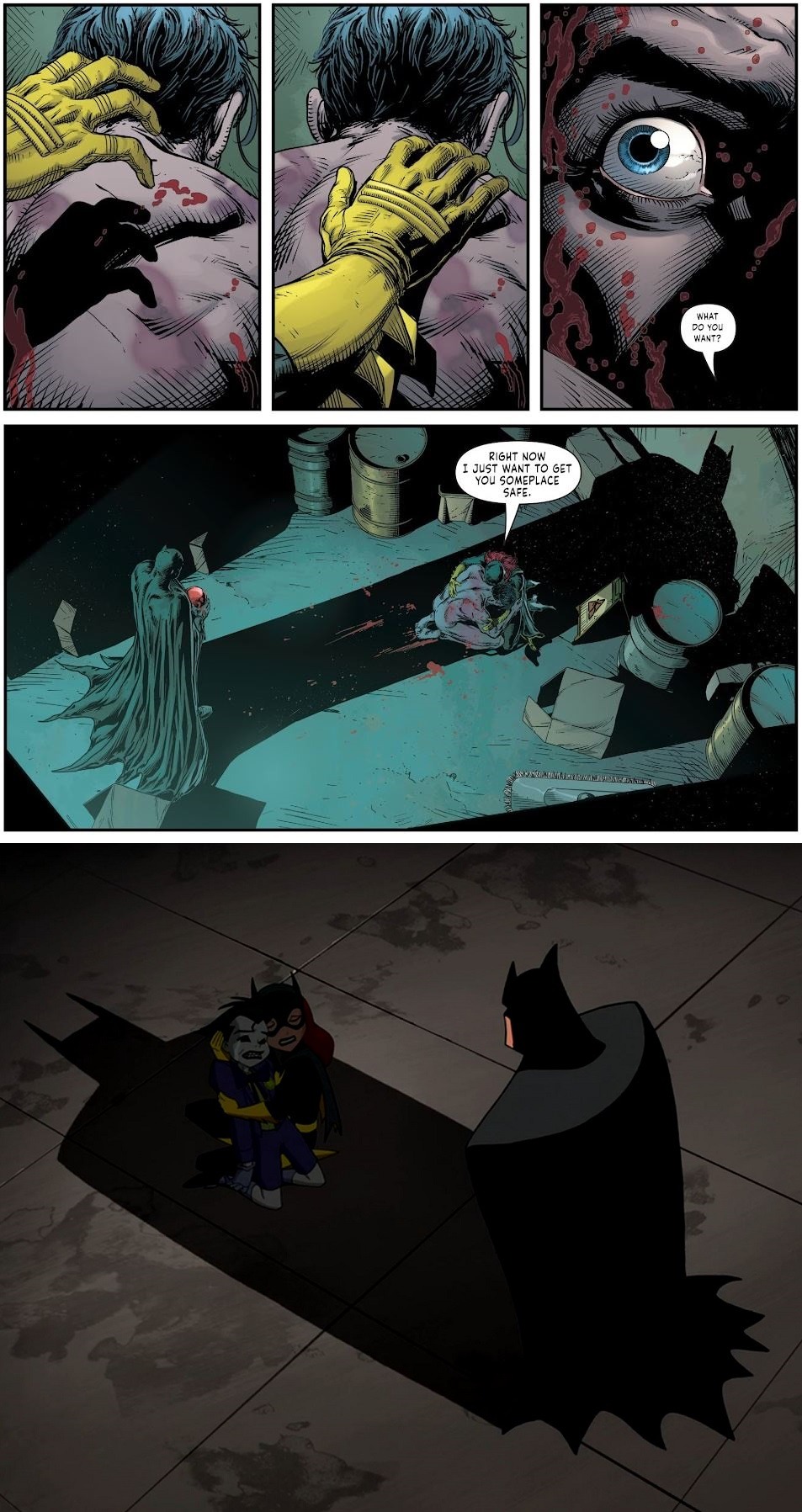
A direct reference to Return of the Joker here, focusing on the shadow Batman casts over the lives of his partners, the responsibility he bears in how Joker targeted them to hurt the Bat, and how poorly he offers comfort himself.
It does segue nicely into the next scene, when Bruce and Barbara get Jason to her apartment to rest. Bruce leaves to keep investigating, and Barbara is pissed because this is the exact lack of support that contributed to Jason going his own way. Support is highlighted again when Jason wakes in Barbara's room and looks around.
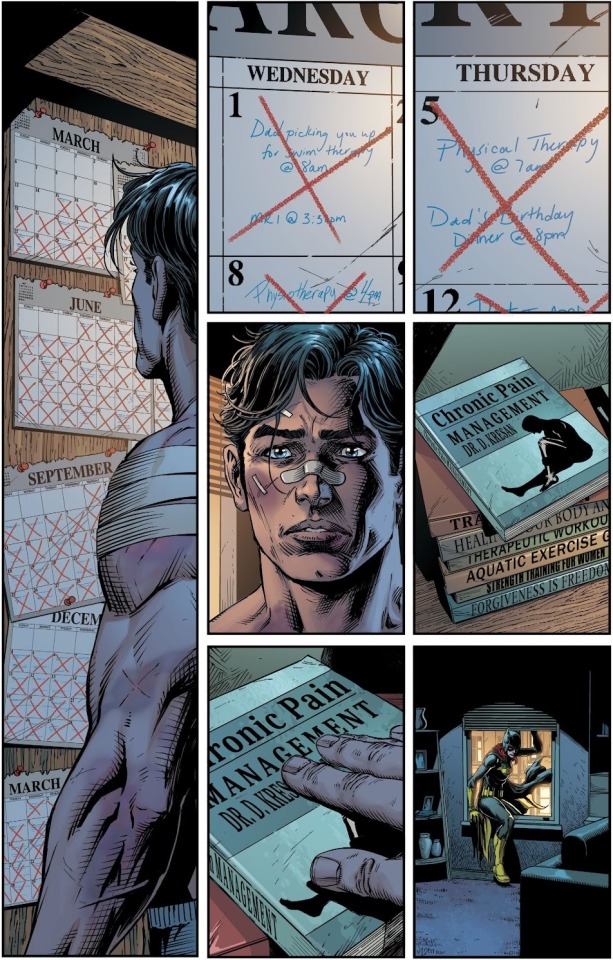
Aside from Barbara seeking out books to deal with her physical and mental struggles after Joker's attack, the old calendars show the help she received from her father and health professionals.
And this scene does get into something that's missing from TKJ, in which Bruce tells Joker that no, not everyone will retreat to madness like he did. How we react to trauma is greatly affected by the resources available to us.
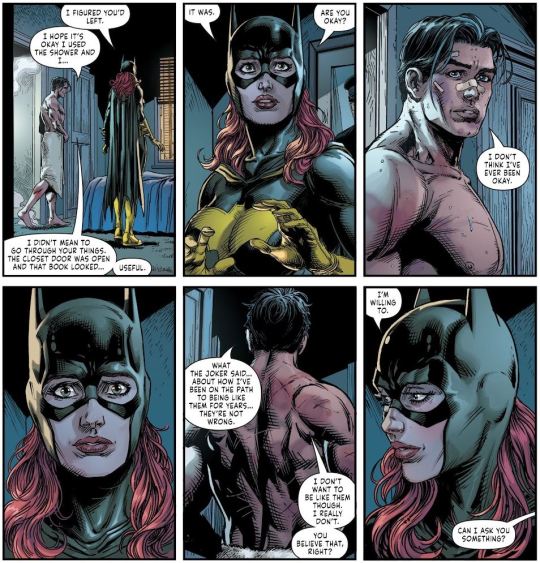
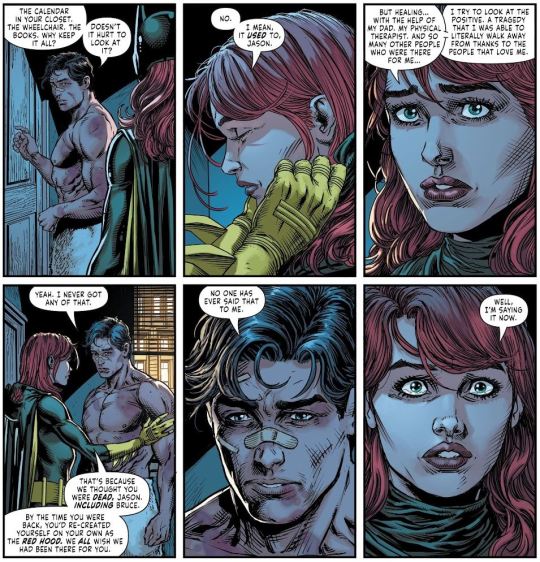
This scene is nice. It's nice to come from the action to some place quiet and for someone to say this Jason, something he's wanted to hear. It's late in coming, but it's pain validated.
And then Johns fucking ruins it.
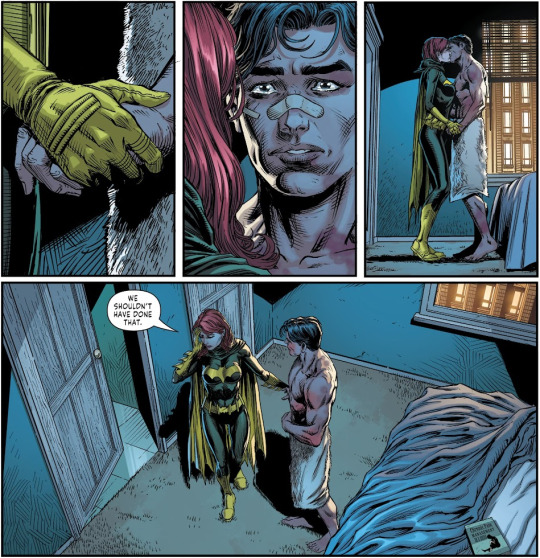
Man. Just. Ugh. Yeah, I know people seek comfort in moments of vulnerability, but… the reader knows. The reader knows moments like this aren't included to be like "oh, this was an isolated blip of human behavior! The story won't call back to it later!" Johns apparently wants Barbara/Jason to be a thing. And if you want a solid reason for that… well, we don't get any good ones.
Meanwhile, Bruce is in the cave, and I'm only mentioning that because these folder labels are incredibly funny:
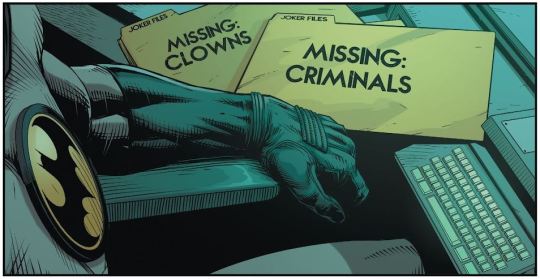
Then the issue ends with Joe Chill kidnapped from Blackgate by the Comedian, who has a video camera and asks him to talk about why he really killed the Waynes. Dun dun dunnnnnnnn! Is that a twist on the way?! Well, yeah, but not really the one you think and it's incredibly stupid.
Finally we are at Book 3. Jason is suited back up, and he and Barbara have met up with Bruce in the cave to figure out how the Jokers plan to create another, better Joker.

Soooooo Jason and Barbara had that whole conversation. Jason was shaken by what the Jokers said to him. But now he's completely back on track. Allllllrighty.
Jason and Bruce then have an argument rehashing everything that Barbara said she was sorry Jason experienced, with Bruce saying of course he'd love to kill the Joker, and Jason pointing out that he obviously hasn't. Jason also says he thinks the only reason Bruce isn't turning Jason in for killing the Clown is to protect Batman's identity. Barbara just tries to de-escalate with her doe eyes. They're back to the status quo, and it sucks, which is the point. When they try to get back to the investigation at hand, Bruce pauses and attempts to apologize.
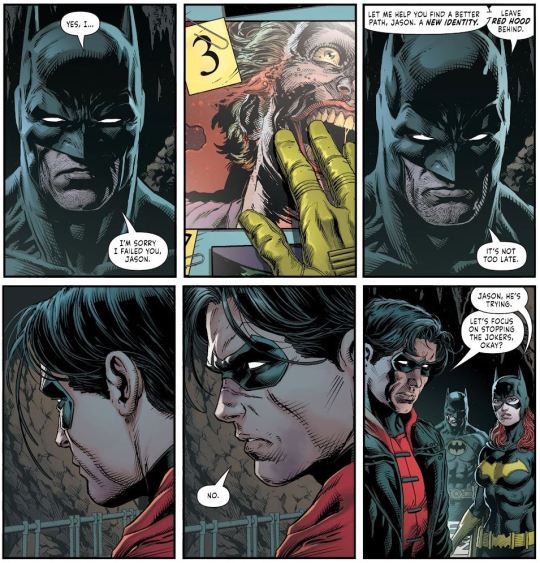
And again, with this blatant TKJ reference, it feels like we need to dig into the parallels between Jason and Joker! They both insist it's too late! They won't take help! But surely Jason isn't as far gone! There's something to chew on here.
But nah, this story is heading toward a big ol' revelation, foreshadowed here:
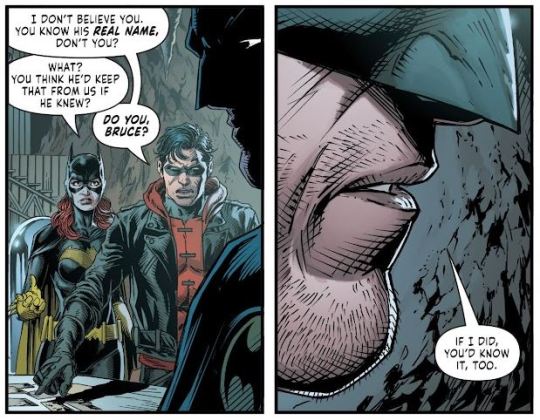
🎶 Why the fuck you lyin'? 🎶
Finally they get the alert that Joe Chill was kidnapped, and on investigating his cell, Bruce finds a bunch of letters addressed to… himself, Bruce Wayne. He seeks out the prison reverend.

Which is unintentionally hilarious, because in the storyline that started this whole three Jokers nonsense, there's a Batman Darkseid War one-shot where Joe Chill's behavior does not remotely align with this.

Lol comics are fun.
In the middle of Bruce investigating the letters, we get Jason being all repentant with Babs again.

You just said? You totally were?? Gonna kill more clowns??? How is this supposed to come off as genuine? Granted, Jason doesn't try to kill the other Jokers after this, but the apparently impetus for reversing course is... uh... we'll get there.
Anyway, among Chill's letters are tickets to the Monarch Theater, so the heroes all head over for whatever the Jokers have set up for them, which of course includes another horde of failed Joker zombies. During the fight, the Comedian's interview of Joe Chill plays on the screen, and the Criminal reveals they have Chill tied up in a chair suspended over a vat of green chemicals.
As Chill on screen explains that he killed the Waynes out of hatred and envy for how much they had, and how much he regrets his actions, the Criminal explains that he considered both Jason and Barbara as strong candidates for the new Joker. And wait. WAIT. Mr. Johns, sir, are you telling me it crossed your mind to write a story in which Barbara becomes the new Joker? That's so much more interesting than the bullshit we're getting! Imagine it: Barbara dealing with the dissatisfaction of being the "good, strong victim" and just losing her shit. You could combine that with how uneasy Jason is with his similarities to Joker, and maybe Jason is the one who convinces Barbara to turn back. This is Black Label! This could've been anything! Anything!
But we've got Chill. And the Criminal goes on to say the reason he wanted to make a new Joker at all:
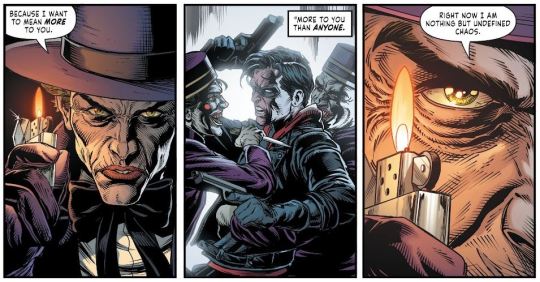
Are… are you? I'm pretty sure Joker is pretty well fucking defined. He's a murderer with a very dark sense of humor who is obsessed with Batman. That's been a pretty good through-line.
Also, Joker pretty clearly means a lot to Batman, as that middle panel with Jason seems intended to remind us, but the Criminal does clarify that he wants to be "everything" to him, which is why he's pulling Bruce's parents' murderer into all this. I guess I can't blame him for reaching for the stars?
Cue big fight scene. The Chill recording continues to explain his regret, and soon the theater is on fire. Batman saves Chill and knocks the Criminal unconscious. Chill thinks Batman is going to kill him, but Bruce saves him from a falling brick wall instead— before the Criminal revives and tries to set off a bomb to kill them all, maybe. There's a BOOM flag sticking out of the dynamite a few panels later, after the Comedian shows up and shoots the Criminal in the head. TWIST!
The Comedian surrenders, and after a scene with Jason picking the most awkward time to suggest he and Barbara try being a couple and Barbara looking pissed she has to tell him no, we jump to Bruce and the Comedian in the armored police car.
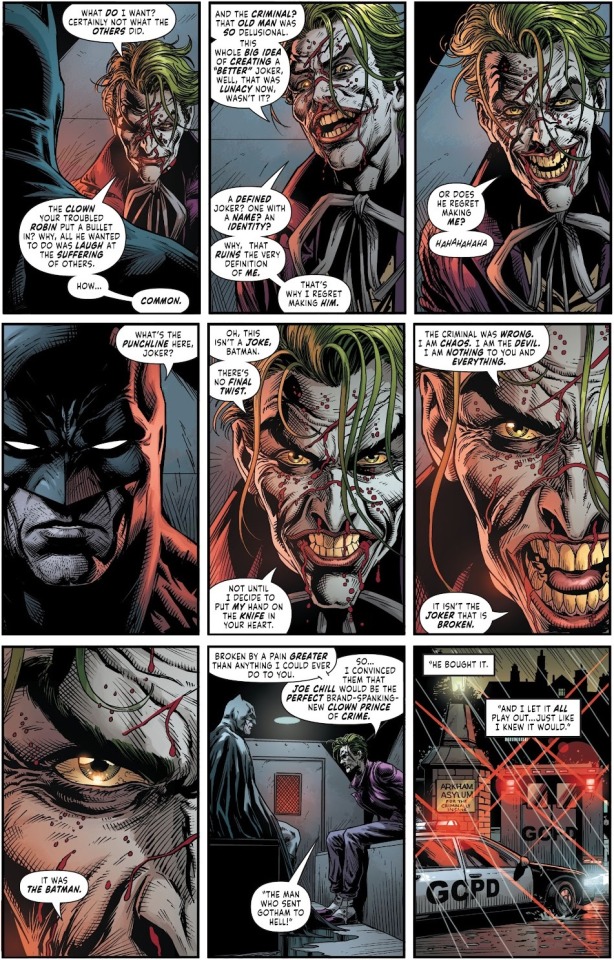

As a batjokes shipper, looking at these pages is weird, because they are good food for the brainworms. The Criminal wanted to engineer a Joker who meant the most to Batman, but the Comedian wanted to be that Joker. It's a weird plan, considering that Joker prefers Batman over Bruce Wayne, so he would be more likely to not want to heal Bruce's wound lest the healing lead to less Batmanning, but still. This crazy plan is all about maintaining Batman's attention.
But I can only enjoy these panels out of context, not just because I'm pretty weary of insanely elaborate plans that manage to work out, but also because there's just so much to hate in the rest of the story, especially the real twist that closes it out.
Before we get to that, though, we're thrown back into the Jason/Barbara nonsense with a very gross letter he writes to her.
"Dear Barbara, I want to make a change. But I can't do that without you. I know I've come across cold and distant…"

1) Look, love can help people heal. Barbara could be a good friend advising Jason on what might help him. She could help bring him back into the batfam fold. This letter is not that. This letter is pushing someone to be in a romantic relationship with you for the explicit purpose of getting them to heal you. That's not how love works. That's using someone as a tool. It's supposed to be sad that Barbara never sees the letter but it's good, actually. Don't put that shit on her!
2) This romance came out of freaking nowhere and now we get Jason insisting he can simply stop being Red Hood for the sake of it— but only for the sake of it, apparently! Does Jason think his worldview as Red Hood is an impediment to healing or not? This is just surface-level melodramatic nonsense. And I wish that was the point, but no. Again, the letter getting swept away is presented as sad.
3) Speaking of which, who tapes a confessional letter that exposes your vigilante identity to a door where anyone can see it? You'd slip it under the door at least. Johns couldn't figure out any other way for the letter to vanish? Get out of here with this contrived nonsense. There should've been panels of Jason rereading the letter, realizing how unhinged it is, and throwing it away himself.
4) Is the "Funtime Cleaners" guy in his purple uniform supposed to be Joker? Or representative of Joker's influence on their lives? If yes and it's him, he's a goddamn hero. If it's symbolic, what does that mean, that even when you reach out to others… elements out of your control will keep you alone? 'Cause that sure is bleak for a book allegedly about healing.
With all that done with, now we get to the big twist, the dumbest fucking part of this story, the end, the takeaway. Of course it involves more crimes against The Killing Joke, which I'm increasingly convinced no one at DC has actually read in the past thirty years.
Bruce drives up to Alaska, and we get this reveal.
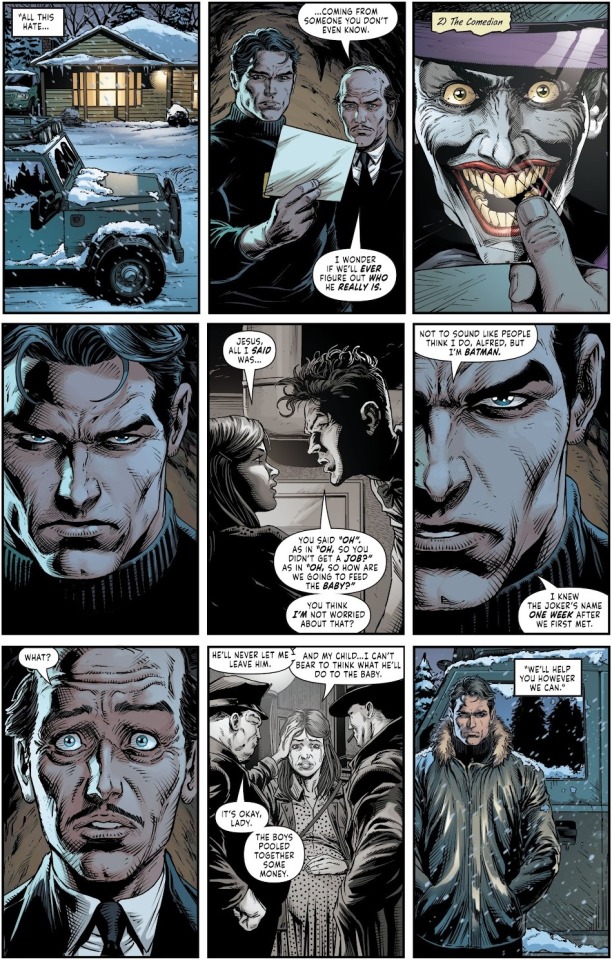

Do the kids still *headdesk* nowadays? That's what I'm doing. There will be a blood stain.
1) So Bruce has known the Joker's identity, or at least the Comedian's, basically the whole time. We're just retconning that the Joker question he asked the Magic Chair wasn't for information; it was a second test question. And all this is in the face of Bruce lamenting many times over the years that he doesn't know who Joker really is, of him lamenting it in The Killing goddamn Joke. "I don't know him, Alfred. All these years and I don't know who he is any more than he knows who I am. How can two people hate so much without knowing each other?" We're just. Fucking excising that. A line alluding to Bruce's motivation for visiting Joker in TKJ's opening scene.
2) We're rounding out the lazy revisions to the TKJ backstory with some copaganda! Geoff Johns doesn't think it's possible for Joker to have been anything but a horror to his family, but he does think it's possible that random officers in the friggin' Gotham City Police Department— in early Batman lore no less, when they were at their most corrupt— would fundraise for a "lady" they clearly don't know to get her out of the city to safety. Also, what was the plan for when Joker asked to see his wife's dead body?? Congrats, you've come up with something dumber than "Pushback."
3) This scrawls more highlighter on how bad the premise of there being three Jokers is, because the flashback in TKJ happens before Joker starts out. Like that's how Bruce always recalls it; he didn't meet the Joker until after what happened at Ace Chemicals. So isn't Jeannie then actually the Criminal's wife? Because the Criminal is the one who behaves as Bruce remembers Joker was at the start. So is the Comedian obsessed with the Criminal's wife for some reason? Or is the Comedian actually the first Joker, and the Criminal came later and used to be more wacky? What is going on here?
Under all these questions, per the final page, the point of Three Jokers is still visible: ultimately, his victims matter more than he does. But that's a hilarious point to a story that revolves around three of the guy, with very little payoff to the gimmick, and when part of the plot is that the heroes still shouldn't kill him.
And again, just because a story makes reference to healing, it doesn't mean it's "about" healing. The most we get is the knowledge that Barbara and Jeannie received support from other people. There's no discussion of how long it took either of them, of why Barbara came out the other side not wanting to kill Joker, of anything Jeannie has done since she left Gotham. The possibility that Jason could find connection is promptly throttled by a forced romance. It's implied that the Comedian's plan worked for Bruce, as we see Bruce at Chill's deathbed, holding his hand, and at Chill's grave. You might be interested in Bruce's thoughts as he juxtaposes Chill's repentance against the fact that his parents are still dead, so you can assess if this really would affect the feeling of loss that drove him to his lifelong mission, but you won't get them. The "how" of healing is up to the reader— who is never asked to extend the same thought process to the Joker. And you personally do not have to give a crap about Joker, but again, if this book is supposed to be about responses to healing, about Jason's response versus Barbara's, then taking an actual look at Joker feels relevant!
So there we are: fourteen pages of me venting my little heart out, hoping the premise of Three Jokers never gets looped into canon. I'm well aware that my personal attachment to a character means nothing against DC's incentives to promote stories with Big Twists (and endless events and multiverse bullshit), but then again, those incentives are based on what people will buy. So if I can add to the voices saying that Three Jokers is bad, and you should not spend your money on it or books like it, maybe I can be one vibe of many that keeps the Joker as one single bat-obsessed murderclown...
Though if not, I can always retreat to older comics. I still have plenty of those to get through.
#three jokers#the killing joke#batjokes#batman#joker#bruce wayne#barbara gordon#jason todd#analysis#my jibber-jabber#tl;dr three jokers is just usual batman stuff with a dumb gimmick#and jaybabs thrown in for the lulz
119 notes
·
View notes
Text
who is the MOST aromantic coded character in ted lasso (NOT ASEXUAL)
#aro tl#ted lasso#aromantic#aro#ted lasso s3#ted lasso spoilers#keeley jones#roy kent#jamie tartt#barbara (ted lasso)#rebecca welton#mae (ted lasso)#trent crimm#afc richmond
47 notes
·
View notes
Text
it’s casey’s fault for saying it and putting it in my head but i will be thinking about beard/barbara for the forseeable future. thanks for asking
#i just think they could be fun crazy together. its about stoicism its about loyalty its about someone who BALANCES you instead of someone#who pushes you further into your bad ways.#i am a jane anti forever. not sorry#(efink voice) i dont hate women. i HATE that bitch#tl#coach beard#barbara#do we ever see barbara drink in canon?? ive decided she's sober bc projection and i think its fun <3 canon to me now#s3 is a shit show i decide whats real
52 notes
·
View notes
Text
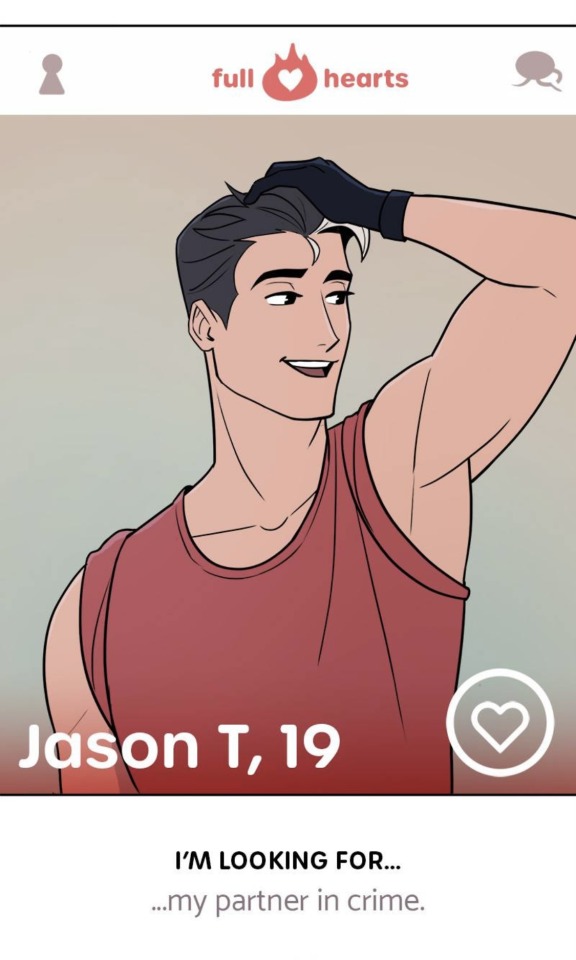

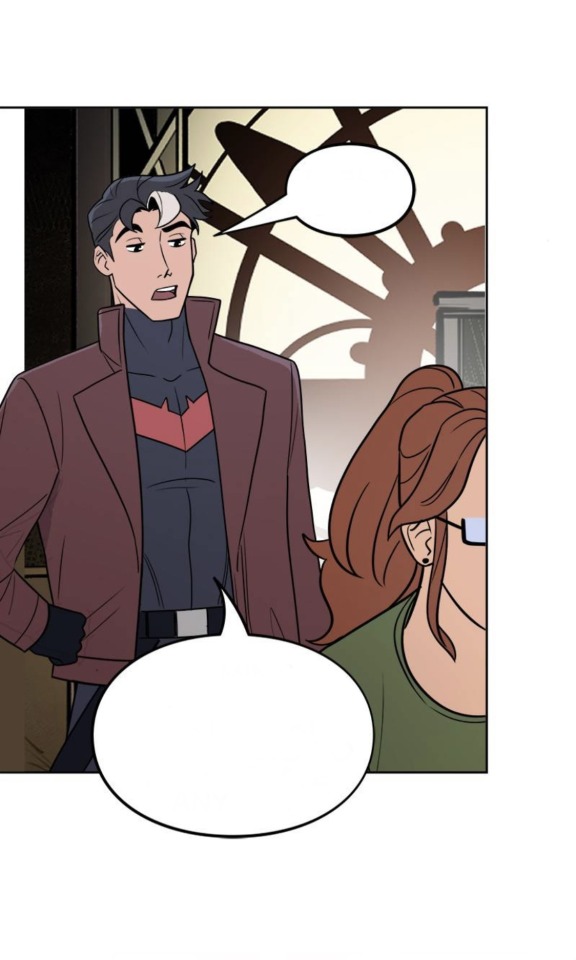
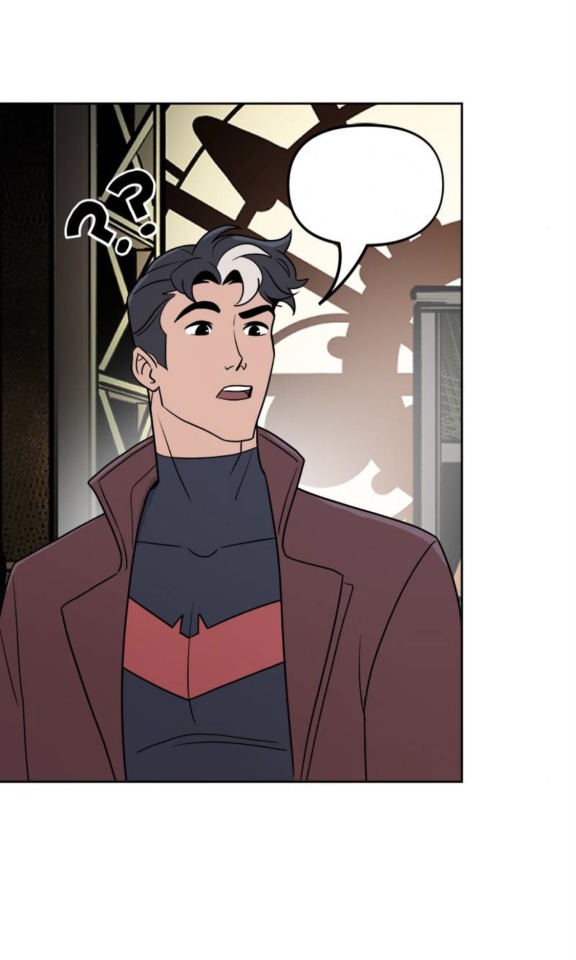

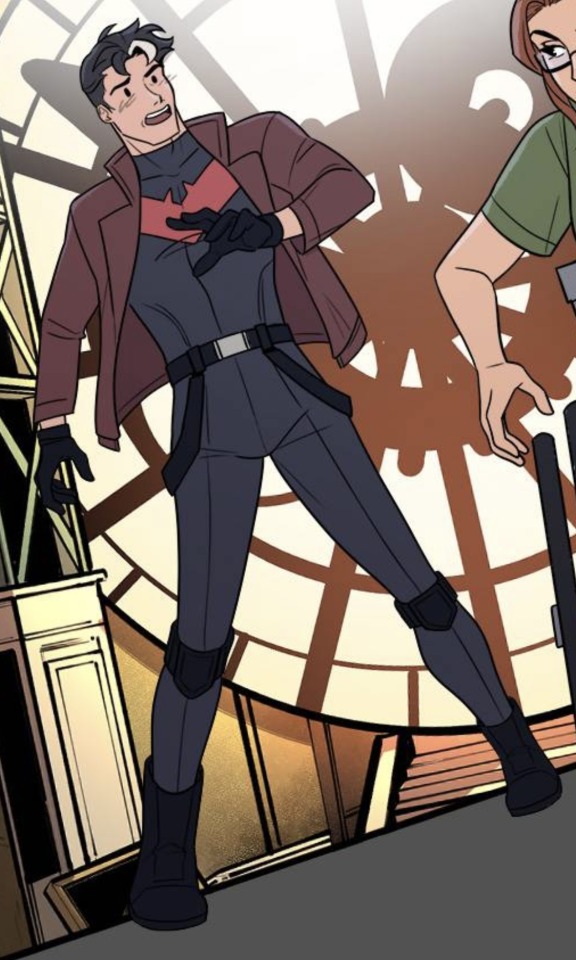
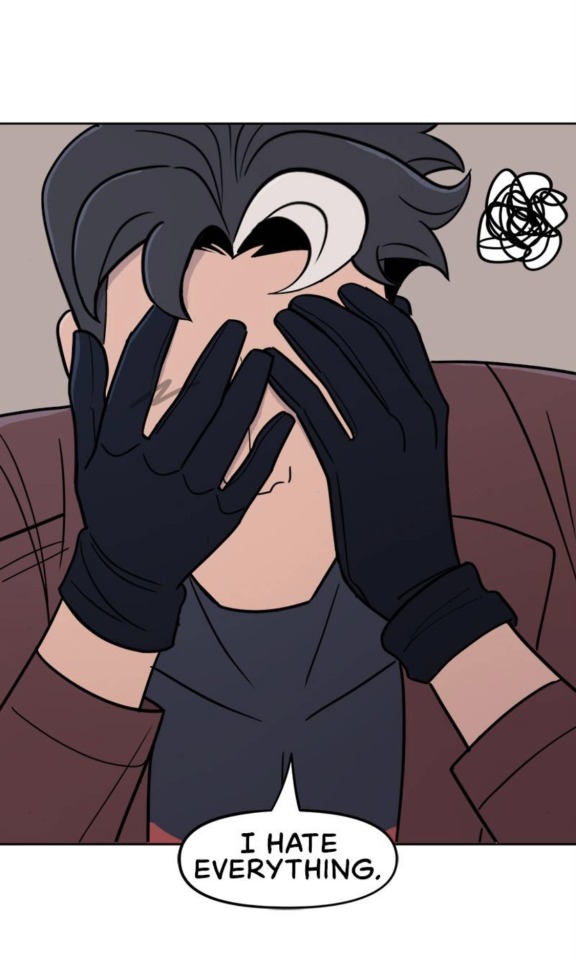





Jason Todd in "Online" (ft. Babs) | Batman: Wayne Family Adventures #53
Bonus: As chibis!

#batman: wayne family adventures#wayne family adventures#wfa#red hood#jason todd#dc oracle#oracle#batgirl#barbara gordon#~#~e#@tumblr mobile pls update the app so i can upload more than 10 pics already >:(TL#anyway MY BABY LOOKS SO GOOD??? G O D
81 notes
·
View notes
Text
My new Ted Lasso ship is Me x taking Barbara on a date to a hockey game.
5 notes
·
View notes
Text
finally able to use the serenitea pot function on genpact ... only to be terribly disappointed with how limiting the permissions for decoration are 😭 I already have " too much " in my realm ? I don't even have all of my companions placed ! 😭 I feel robbed ...
#( 🌸 | ooc // .mobile. )#( it's almost as if this function is not the main genre of this game sofnskdk#listen 🥺 I was told that I could live my animal crossing x genshin crossover dreams with this teapot#but all I got was a bunch of disappointment & text boxes alerting me that there are ' too many trees & buildings '#excuse me?! EXCUSE me! 😭#also ... it's a little strange but I'm not interested in Yelan or Xiao#HOWEVER ... Noelle? 👀 I DREAM of c6 noelle !#& Barbara?! I'm becoming more tolerant of her singing ... if I set that aside ... she's growing on me 😭✋#my good friend helped me turn her into a fantastic healer ( consid. I don't have Kokomi ... )#tl;dr: I am ambitious 🥺 )
10 notes
·
View notes
Text
does anyone have any good barbara gordon blogs to follow?
#dc comics#barbara gordon#i just don’t see enough of her on the tl and would like to see more#honestly feeling inspired to start a dedicated blog to her in the same way there are dedicated sharon carter blogs#whom i love btw like the sharon carter blogs have done so much for her fandom and have singlehandedly turned public opinion of her fr#but i don’t see many of those for babs#and that’s such a shame that there isn’t an active archive for her works#i’m still easing myself into comics so idk i’d be up to doing that just yet on my own#but heyyyy if anyone wants to chat babs with me#my inbox is very much open
0 notes
Text

Hadn’t seen this one hit the tl
From Courtney’s friend Brianna (left) instagram
So cute!
Pretty sure these are in Santa Barbara (Santa Ynez mountain) as that’s where the venue was
I think they each picked their oldest friends as witnesses 🥺
212 notes
·
View notes
Note
Hey so I've been wondering about inclusivsm vs exclusivism in Christianity and the Bible. I've had more of a inclusivst view before, but I find that there's also a large amount of exclusivism in the Bible. So, I was wondering what you think about it overall? Is it both? Neither? Nothing? One? Anyway, may the Lord be with you always 💛💐
Hi there! I am 100% against exclusivism, and lean towards religious pluralism. For me that means I don't believe that only Christians go to heaven, that Christianity is the only "right" belief system / that Jesus is the only path to the Divine, or that Christians are God's Extra Special Favorites.
When we pray Thy will be done, we look forward to God's will succeeding — and what God wills is abundant life for everyone! Not just for the Right Kind of Christians; not just for all Christians in general; not even just for all human beings; but for all Creation.
There are numberless ways to worship the Divine, to express faith, to glorify our Creator. Wherever there is life, there is Spirit. Wherever there are beings seeking to bring life, Divinity is glorified.
The diversity of faiths is a holy gift that we too often twist into a flaw to be corrected. God shaped humans to need one another — alone, our perspectives and gifts are limited; only together can we hope to come close to understanding the Divine. We have so much to learn from one another — if only let go of our smugness, our sense of superiority, our need to be the ones with All The Answers. If only we let go of the fear we've been taught — fear that we'll go to hell if we're wrong; fear that others will go to hell if they're wrong.
Sorry for waxing poetic lol. Here's a post where I explore inclusivism vs. exclusivism in more depth, including looks at various Bible passages.
Other related things:
Here's a really old post/video that gathers some of my thoughts on inclusivism, salvation, heaven.
Here's a more recent post where I talk about why I don't believe in hell.
My evangelism tag (tl;dr: I'm staunchly against prosletyzing to anyone who doesn't explicitly request more info about Christianity)
I highly recommend the book Holy Envy by Barbara Brown Taylor for a Christian framework for forming respectful, mutual relationships with people of other faiths. This tag has some excerpts from the book.
45 notes
·
View notes
Text
I have a lot of feelings about Jean’s birthday letter
Frederica is often portrayed as strict and sometimes even cold, but she actually seems very caring here. She sent a letter and a gift!!
The fact that Jean received it the day before and not the day itself can attest to the fact that Frederica is meticulous and attentive. She’s careful with schedules and makes sure things arrive on time, with some wiggle room even. But it also shows that she treats Jean’s birthday as something important. She did something for her and made sure she would receive it on the right day. She’s showing love and affection.
The gift itself being a sword shows how much Frederica sees her daughter as a knight first and foremost. It is a nice gift and a nice gesture, but it’s work related rather than hobby related. It’s practical rather than simply something that would bring her joy. It reminds me of Jean’s first birthday letter, where she said that her mother used to take her to Windrise, and Windrise is a beautiful place to just enjoy a stroll, but it’s also a very meaningful place for the Knights and Mondstadt’s history, and I’m rather inclined to think that it’s not just for the scenery that they would go there. Jean’s birthday is not meant to extravagantly celebrate her as a person. Jean’s birthday is not just for herself, it’s for her to honour who she is as a Gunnhildr. It’s to help her in her knight duties.
It may seem a bit cold to treat Jean as a knight on her birthday but I don’t think Frederica is doing it on purpose. I don’t think she is being cold at all, actually. I think she’s being very loving, and that she doesn’t know how to express love in a different way. Frederica’s relationship with Jean probably revolves around knighthood, so it is lacking, in a way, in terms of showing affection, but at the same time when you’re both entirely dedicated to being a knight, a sword is a beautiful gift. It’s the best proof of love that she could give. Frederica is not not showing affection, it’s just that she’s showing it through beautiful swords.
Also, Frederica probably sees herself the same way: a knight first and foremost and it’s probably the same kind of love that she received herself. (I don't think Jean herself has ever mentioned her mother for something that isn't related to heritage, duty and knighthood... So I'm not sure Jean herself would express affection for her mother in a way that isn't related to being a Gunnhildr...)
It’s actually a thoughtful gift. It’s Frederica saying "I found a nice thing. Here, I think you should have it". She’s on an expedition herself so the sword could be useful to her or someone else within the expedition. But she’s thinking of her daughter first. She wants to help her from where she is. It’s practical but in a very caring way.
Although… Frederica did offer a dress to Barbara, so she doesn’t always give practical gifts; she can give something that is just pleasing. But maybe it’s because she doesn’t have the same relationship with Barbara. Their relationship isn’t defined by the weight of duty as it is with Jean. I think Frederica offering a dress is a way to keep contact or reconnect with the daughter who doesn’t live with her. But she doesn’t need to get closer to Jean, she just needs to support her. They already share something: knighthood and duty. So sword it is. And Barbara gets a flower dress and Jean gets her mom’s old outfit. (Unless… Barbara did wonder when she would get to wear the dress on stage, so maybe it was destined for shows rather than a nice everyday life thing, and it would also make it a practical work related gift?)
TL;DR Knighthood is Frederica’s love language for Jean. She said I love you.
48 notes
·
View notes
Text
The Failure of Ted Lasso's Unconventional Politics
SOCIAL CONDITIONING:
According to Brendan Hunt, shippers interested in a second chance, mature-age romance between Ted and Rebecca were being blindly, un-self-reflexively led about by their “social conditioning”. Presumably, however, the writers who wrote Ted returning to his heteronormative family unit – as well as all the viewers who enjoyed this ending and have defended it since – are completely free of social conditioning? No social conditioning is involved in reifying the white heterosexual family unit? No social conditioning is involved in deifying parenthood, fatherhood and patriarchy at the cost of all else? There is no social conditioning involved in a conclusion that values good ole working class Americana while rejecting the big, queer, complicated, multicultural world?
KISS (Keep It Simple Stupid):
If the creators wanted to gesture to “Cheers” as a classic American sitcom, then at least learn from its example. This show worked best when it worked with familiar, beloved characters in a familiar, beloved, but confined setting. "Ted Lasso" had a near-perfect first act, doing a simple thing well. But from s2 onward, the show started straying out of bounds. The cast of characters kept expanding and contracting: people were in, people were out, characters were coming and going and changing (what was the point of that whole Zava plotline?). We had multiple workplaces and workplace dramas (grew to like Barbara tho). Episodes got long and unwieldy. Themes got convoluted as the show took a long trip, imo, up its own arse. The folksy wisdom of s1 became grating self-indulgence and cliched “moment” manufacturing.
SUPERFICIAL UNCONVENTIONALITY:
TL employed a familiar 3-part structure but ultimately its supposedly radical, unconventional politics was not reflected in the show’s structure. Since the first act started with Ted's arrival, you could see his departure coming from a mile off. Some folks are acting like returning Ted home constitutes some super brave move by the writers that we've never seen before. But if you want to talk social conditioning expressed through narrative expectation then you really couldn't get anything more conventional than this ending.
We've seen it all before:
Act I: Fish-out-of-Water character arrives and begins winning over a dubious, dysfunctional community
Act II: Bonding, hijinks, missteps, complications and development
Act III: Revelations of growth. Community sadly waves goodbye to teacher they love but no longer need. Cue credits with moving song choice.
It's as cliche, conventional and predictable as it gets. And I could condescendingly accuse every viewer who enjoyed this ending as being blindly and un-self-reflexively led around by their social conditioning. But even if I'm not one of the showrunners who also played a beloved character and who is speaking on a public forum, that would be a pretty fucking shitty move. What I am saying is that the disagreement over this ending speaks to some core ideological differences currently playing out across the globe around patriarchy, feminism, queerness and privilege. There is an opportunity here to examine what we socioculturally view as “good’ and “right” and “happy”. These ideas of good, right and happy are not necessarily benign and will be inevitably reflected in and reproduced by our art.
PATRIARCHY:
In the end, “Ted Lasso” literally chose patriarchy (but what kind is the question). Just because this show was working with a familiar 3-part structure, that doesn't mean it didn't need to justify Ted's inevitable departure. For many people, his son is enough. That's it. End of conversation. Henry trumps all. And yes, this was always going to be the justification used by the series. But I think this disagreement highlights changing attitudes to modern parenting. Everyone agrees that parenting requires sacrifice: large and small, everyday and lifelong. But how much sacrifice is too much?
For some people, this was too much sacrifice. Others seem to think it was Ted's duty to sacrifice for his son his own sense of family and community, his continued health and growth, his professional fulfilment. Imo, he could have shared all of this with him but chose old-school parental sacrifice instead. I consider this kind of sacrifice to be something that culturally we’re coming to recognise as unhealthy, for both parent and child. In reality, parents are more than one thing. Parents have jobs, interests, relationships, needs, limitations and struggles. Parents are people.
In the series, Ted was established as a person: a person with a sad past, a tortured inner world, a strong desire to connect with others and, potentially, a brighter future than his past. From the beginning, his relationship with Michelle was established (and often reinforced) as over, dead, absolutely no route back in. But his relationship with his son was loving and important to him. Of course it was. He’d be a bad man and unlikeable character if it wasn’t. Even so, Henry isn’t a major or fully realised character in this show. We care about him, relate to him through Ted. He matters to us because he matters to Ted. But frankly, we are far more attached to Ted’s other adopted “children”, the relationships we have watched him develop over 3 years, than the relationship we only saw glimpses of. That’s just narrative reality. In reality, yes, Henry would and should be Ted’s first priority. This is only right. In fiction, the team at Richmond should have been the first priority of Jason and the rest of the writing team. They are the ones we want to see and want to see happy and settled.
As many frustrated viewers have stated, it's not Ted's departure that is so disheartening but how it was done. If the TL team wanted to make this choice seem like a healthy one for Ted then they needed to establish other things waiting for him in Kansas: friends, community, employment, fulfillment. As it was, literally nothing tipped the scales in favour of Kansas. There were no romantic, community or larger familial relationships to get back to. Far too much was just left to inference or imagination. Yes, we can assume that Ted has community in Kansas, that he will probably get a great job after his success in Richmond. But all the people and opportunities we would like to infer/imagine will never tip the balance towards Kansas when we consider all we KNOW is already established for him in Richmond. The homeworld and beloved characters of a show will always hold more emotional weight than anything undefined and hypothetical. If viewers were to be happy with Ted’s exit then the writers needed to take the time to lovingly define his future away from the club.
Instead, it seems like a deliberate choice to shut Ted down and perform (and I do mean “perform”) this marvelous sacrifice for his son that so many think is admirable. It’s this shutdown that is so inconsistent and confusing. Because at any time in the hour, Ted could have said to Rebecca, the Diamond Dogs and/or his team:
“Look y'all this ain't the end. We’re family now. I'll be back. I'll show y'all round Kansas anytime you wanna visit. My mom will cook a dinner that will clog your arteries. And every so often, what say we do a long-distance movie night, huh? I'll miss you all but I’ll be watching every game and I can't wait to come back and see you win the whole fucking thing!!”
Ted could have been a model of honest, expressive, emotionally forthcoming, relationship-maintaining masculinity. But nope. Not a word. Just brave male sacrifice. It's straight up patriarchal propaganda. And truth is, fathers sacrifice way less than mothers do in heterosexual parenting relationships. Mothers are generally the ones making those small, everyday sacrifices that our society rarely acknowledges or admires. But I bet this ending makes all those lazy husbands and boyfriends feel real good about themselves. I bet it makes many female partners feel all warm and fuzzy to know that even though their kids’ father won't share half the labour that goes into raising a child, when it comes time for him to perform a massive manly sacrifice for his family, he toootttaaally will. I'm sorry, what were you saying about social conditioning Mr. Hunt?
FATHER GOD or WHITE SAVIOUR?:
Patriarchy needs its Father Gods and its Mother Gods to play certain roles (tho, to paraphrase Angela Carter, both are as silly as each other.) These magical figures materialise at pivotal times then dematerialise when the narrative is over, the pivotal lessons learned. They never themselves learn or alter. Think Mary Poppins or Nanny McPhee. These figures are not entirely human, they possess an element of the supernatural. They serve others, serve a higher purpose. Nanny McPhee's appearance changes only as a reflection of her charges’ growth. Mary Poppins – the figure to whom Ted is most likened – learns to care about her kids but she doesn't engage in any self-introspection. Her duty and trajectory remains unchanged. When she arrives at her next job, she will do so exactly the same as she was.
These otherworldly mother deities are not unproblematic feminist figures themselves. But creating a male, fatherhood deity becomes even more problematic when he is white, cis-het and pretty able. Ted arrives to teach all the black and brown lost boys, to unite the disconnected women, liberate the closeted gays and to update the bumbling English gentlemen (there is, I feel, a special relish in these American bros educating their former colonisers on modern manhood). Here, we start to stray into white saviour territory. Frighteningly, this kind of patriarchal demi-god implies that white men are the most progressive figures in a society, they are in the political vanguard, championing the needs of the disconnected and downtrodden. White men are the ultimate source of wisdom, kindness and progress. It represents them as a group as progressive, when in reality the attitudes and politics of this group represent conservative politics and regressive values that impede the progress of every other marginalised group. If we buy this myth about white men, then we are more likely to accept what they say to us from their positions of power and privilege as right, wise, kind and progressive, even when it is the opposite.
So, if you are going to put forward a white man as a model of progressive politics, then you need to embrace unconventionality, not just superficially but down to your bones. “Ted Lasso” tried to structure s2 and s3 differently but just ended up making a mess of allusions and ideologies that did not connect, cohere, develop or conclude. In fact, sometimes they straight-up contradicted. Employing a magical 3-part structure and making a bunch of meaningless allusions to well-known classics does not another classic make. They did not engage with any of these classics (“Cheers”, “Mary Poppins”, “The Wizard of Oz”) in any deep or critical way. Classics may be loved but they are not faultless. If you simply repeat what has already been done, even in celebrated classics, you may just end up repeating mistakes someone already made for you to learn from. TL repeats the central feminist problem of parental deities in “Mary Poppins”, just as it repeats the irreconcilable ending of “The Wizard of Oz”.
LIMINALITY:
Both “The Wizard of Oz” and “Mary Poppins” take us into strange liminal worlds. “Ted Lasso” could be read similarly, except that Ted doesn't take any magic home with him. In fact, he seems to actively forget it, reverting to the Ted he was before leaving. No queerness or feminism follows him home, no traces of the various cultures he's come into contact with. The liminal remain liminal with no indication that these two worlds will communicate or can integrate. The non-white, female, queer and otherwise bizarre are left outside of Ted’s squeaky clean hometown heteronormativity. And I really don’t think I have to explain why that is so deeply irresponsible. Because again, this is a writing choice.
That epilogue at the end was brief but imagine if it included more detail: Ted texting with Rebecca, or facetiming with Roy, Jamie giving Henry advice. They didn't take the time to honour and continue these relationships or integrate these two worlds. They didn't suggest that responsible fatherhood could entail many things, could look different. “Sacrifice,” they said profoundly. “Fatherhood,” they murmured mistily. “Patriarchy” was their final word to which this feminist says, “Bullshit.”
PRIVILEGE:
I only did one film unit at uni but it really doesn't take much to deconstruct the absurdly inconsistent ending of “The Wizard of Oz”. It was 1939, the end of the Great Depression and the start of another devastating world war. People needed to be convinced that their small ramshackle b/w lives surrounded by loved ones were stable, noble even. They already had everything they needed. They didn't need Oz. They didn't need bright futures, big adventures or exciting opportunities. Monochrome Kansas was all a good American should ever hope for. There was danger in difference, safety at home.
Well, here we are in late-stage capitalistic hell, having come through (???) a pandemic and it takes a special sort of privilege to say to an audience: you don't need money or opportunity or community, they won't make your life any better than before. Be happy with the muddy and mundane. Be happy with what you've got. Turn away from larger community, greater knowledge, continued stability, and isolate yourself in a bubble of you and yours. Look, it's not a sweet or familiar narrative conclusion but the truth is, Ted’s, Henry’s and Michelle’s lives would have all been better if they'd relocated to London. Do these dolts have any idea what teachers (in the USA esp) are currently going through? How overworked and underpaid and undervalued these people are? The burnout rates?? Ted didn't have to take the highest salary Rebecca offered but, had the writers been willing to put in the effort, a more unconventional, more modern ending to this series could have been crafted.
Not that I'm surprised they took the easy road to glory. All indications from the beginning of s3 suggested that this would be the rather predictable conclusion. Indications do not, however, constitute development. This team had the opportunity to write a new ending to an old story, one that incorporated queer, feminist and anti-capitalist values. One that defined a different, new version of patriarchy. They didn't even think to. In their white boi hubris, they just assumed that they and tradition knew best. Considering how many viewers would be struggling right now for food, housing, employment and opportunity, an ending in which Ted turns down an opportunity like this hits a false, rather virtue-signally note. Literally, nobody would have come out worse. Everybody would have benefitted from Ted staying in Richmond. Which means this decision was made purely to manufacture a “moment” that celebrates patriarchy.
ANTICAPITALISM: There’s a reason they had Rebecca offer Ted the biggest salary in his industry. They wanted to make it NotAboutTheMoney! Ted doesn’t say so (doesn’t say anything) but, because this narrative idea is so fucking familiar, we can assume the thoughts behind his oh-so-sage expression are: “Well, shucks now, boss, I rightly do appreciate the kindly offer but that there kid o’ mine is more important to me than any cash you could put in my silly lil handy-hands.” Good Lord. The cringe is real. I really, really can’t with this mighty, manly silence and sacrifice. My problem isn’t that Ted values his son over money (not that it has to be a choice because that money could benefit Henry and his mother, who is owed a heck of a lot of child support esp since she’s been raising their son solo for 3 years). Again, that is how it should be. My problem is that the show actively established Richmond as an anticapitalist landscape, then suddenly at the eleventh hour, tried to walk that back and imply it was actually a capitalistic landscape (in contrast to homey ole Kansas).
Capitalism teaches us to sniff at money. We've been told by the monied and privileged that it won't buy happiness. (This is of course, utter bullshit because money can buy you a hell of a lot of wellbeing, security and opportunity). At the beginning of the series, Rebecca Welton stands for this principle. And by the end, she has found a way to use her extreme wealth and privilege in an ethical way. She gives it away. She supports others. She lets Sam out of a promotional contract, she funds Keeley’s business, she sells half the club to fans. The most obvious example of Rebecca’s anticapitalist politics is her confrontation with all the richy riches who want to take soccer away from the people. Here, she becomes an anticapitalist leader, one who has been positively influenced by the anticapitalistic politics of The Lasso Way.
The Lasso Way is anticapitalistic in that it stresses that winning isn’t everything. You try but you try together. You play hard, not in order to beat the other guy, but to be the best (player, teammate, man) you can be. There are no individual stars, only collaborative team players. You give due credit to others, the team, the support staff. The club functions well when it functions as a unit. Over the course of the series, it becomes a commune that protects and nurtures its citizens. A socialist haven that values people over profits, prizes and meaningless acquisition. The Greyhounds don’t want to win the league for the money or the top spot. Winning the whole fucking thing is an expression of their regard for each other, the game and the new, kinder ethos they all now live by.
Because they spent 3 years establishing all of this (during a time when we really needed to hear it), there is something v disingenuous about them then having Rebecca offer to go to extremes to pay Ted more money than any man should have. It is not consistent with the show’s themes, the ethos of the club, Rebecca’s attitude or what she knows of Ted. She knows it’s not about the money for Ted. It never was. It’s an act of desperation on her part, but why did they need to make her ridiculous, desperate, so inept in this moment? Hannah plays it beautifully but I can’t help but feel this is part of them diminishing Richmond, (re)casting it as excessively capitalistic in relation to Kansas so that they can turn Ted’s decision into a simple Money < Son choice. Because if it is a Money < Son choice then he has no dilemma. There is no other choice. He goes home to his son. The problem is, they’ve just spent 3 years proving that it is not a simple Money < Son dilemma. Money was never actually part of this equation. Ted left to give Michelle space, to find himself, to find a new life and community, to extend himself beyond what he knew as normal. As such, there is now far more than just money for Ted in Richmond (which tbf, Rebecca also points out, but I still think this point stands).
The other major problem is that, here in the real world, middle-class America (which btw does not exist) is far from being a haven of peace and prosperity comparable to nowhere in the world. This is a lazy cliché than any amount of travel should quickly disabuse you of. And yet in Kansas, we are supposed to believe, despite everything happening in America (referenced by Henry in ep 3.01), Ted will find community, opportunity and stability. To pull off this ending, they needed to establish a Kansas unlike the one currently in existence. This is what they did with Richmond. The UK is no better than the US currently, but they nevertheless established an ideal society, one with values very contrary to the world we now live in. Is it any wonder that people saw the desertion of this world as a rejection of feminist, queer and anticapitalist values? Right now, more than ever, people want to believe in a society that isn't all about triumph, success, competition, acquisition, individualism and aggression. They want to believe in a society that emphasises community, values people, shares wealth, offers opportunity, encourages difference, improves lives and moves onward, forward, in circumspect but ethical steps. These themes were all there in the series. They just weren't utilised when it came time to shape its conclusion.
#ted lasso#ted lasso finale#ted x rebecca#jason sudeikis#brendan hunt#istg i'm done#i'm a ridiculous person#long post#did anyone read this?#fuck i overthink#dumb show#rebecca welton#rebecca welton deserved better#feminist queer anticapitalist rant#i'm here to tell you that if you like ted lasso you're probly a socialist
132 notes
·
View notes
Text
BARBARA SHUTTING DOWN THE “love is love” AROMANTIC MOMENT FOR FUCKING REAL
27 notes
·
View notes
Note
If you don’t mind me asking, one question I have that you might be able to answer (seeing as your pretty much the Cass expert around here) - how often has her age relative to the rest of the batkids been brought up in canon?
I’m just curious because every now and then I see it mentioned that she’s around the same age if not slightly older than Jason, which always sort of throws me off a little given how she’s more often paired with Tim and Steph. I guess I’m just curious if you know whether or not this was just something mentioned once and then forgotten about or whether or not this has been a more consistent part of her character.
You're actually insanely lucky you asked me this question tonight, because I had a twitter conversation that prompted me to go hunt down relevant panels and information about this very thing about a month ago. tl;dr: post-Crisis!Cass is the second-eldest Wayne kid and generally written as such; she's consistently two and a half years older than Tim, at least a year older than Steph, and seven months older than Jason legally (and one year older biologically, since Jason was dead for around six months). The only Batkid older than her is Dick.
Canonically, the age gaps between the (pre-reboot) Batfam look something like this:
Depending on which age retcon you prefer (post-Zero Hour or post-Batgirl: Year One), Barbara is either 6-7 years older than Dick or 3-4 years older.
Dick and Jason are approximately 6-7 years apart. Dick is 18-19 when Jason is adopted at 12 and thus 21-ish three years later when Jason dies at 15.
Cass is 7 months older calendar-wise than Jason; biologically she's about a year older, since Jason spent ~6 months dead
Tim is around two years younger than Jason: Tim was 13 when he was introduced a few months in-universe after Jason died at 15. By the end of the post-Crisis universe, Tim is 17 (potentially 18, depending on when Gates of Gotham takes place).
Stephanie is one year older than Tim. This has been confirmed on several occasions, but most notably Steph is explicitly 18 and a college freshman in her Batgirl run, when Tim was 17.
There's 6-7 years between Damian and Tim. Tim is 17 during his Red Robin run and Damian is ~11 by the end of the 2009 Batman & Robin run, though he never turns 11 on-panel.
Those are still the basic age gap guideposts, regardless of "on-panel" post-Flashpoint age retcons. Dick is the sticky one here, mostly because writers could never decide on a) what age he was when his parents died and b) how long he was Robin before becoming Nightwing. Dick's age is also complicated by Tim's backstory, because it gets really sticky if he's too old for Tim to have been in the audience when the Graysons fell.
Anyway...Cass. Cass was 17 in Batgirl (2000) #1; Tim had just turned 15 and was living with his father. While her age isn't consistently brought up, she was treated as a mature older teenager who switches between living with Barbara and independently in the 'cave' that Bruce gives her. We also know she's 18 by 2002 because of Batgirl #33, the issue where Cain tells Cass that her real birthday is January 26th, and Batgirl #37, where she formally turns 18; Tim is still 15 at the time.
Tim turns 16 on July 19th in Robin #116, published in 2003. This once again indicates that Cass is approximately two and a half years older than Tim. This is further confirmed by Batgirl #48 in 2004, where Bruce mentions that Cass is 18, and the fallout of War Games later that year, since Cass relocates to a new apartment in Bludhaven without all of the messy convoluted legal hoops a 16-year-old Tim jumps through to do the same.
As for Cass and Jason, that's discussed in Detective Comics #790, also published in 2004. Bruce takes Cass to Jason's grave on what would have been Jason's 18th birthday, August 16th:
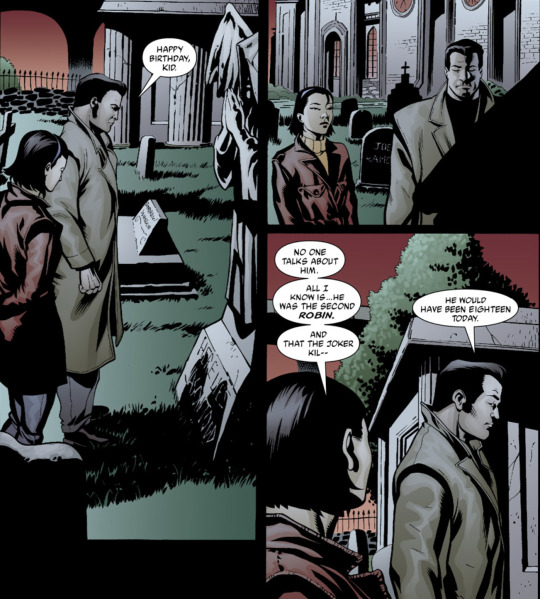
"No one talks about him. All I know is...he was the second Robin. And that the Joker kil-" "He would have been eighteen today." -Detective Comics #790
Ages are always a bit difficult to parse in comics, but this issue confirmed that Cass and Jason were around the same age. While we were never explicitly told whether Cass was 18 or 19 in this scene, we have a very important context clue that provides the answer: Cass's birthday, January 26th.
This would make Cass still 18 during Tec #790, around 7 months older than Jason should have been. This would also keep the correct age gap between both Cass & Tim (since Tim had just turned 16) and Jason & Tim (since they're two years apart). This is further confirmed by Jason being around 19-20 during Under the Red Hood (which I previously puzzled out here), published the following year in 2005. This makes Cass vaguely 20-21 during the Reborn era, since we know that Tim is 17 (nearly 18) and Steph is solidly 18.
In terms of writing, Cass was consistently treated as a slightly "older" character. Tim and Steph were a bit of a matched set even though they were a year apart, but Cass's stories were always pitched for a slightly older and more mature character than theirs. Any writers engaging in infantilizing behavior tended to do so because they were trying to make points about Cass's social skills, not her age. Cass being grouped in with Tim and Steph rather than Jason had more to do with Jason being dead until 2005 and a villain until 2011 than it did age considerations.
So then we get to the post-Flashpoint universe, where we have to throw literally everything I just said out because welcome to the reboot, where the timeline is made up and the ages don't matter:
Cass was re-introduced in Batman and Robin Eternal, where she is explicitly noted to be 16. Stephanie and Tim were both about 17, since Tim's college application arc in Detective Comics Rebirth puts him at 17-18.
But Cass is written as slightly older than Duke during the 2019 Outsiders run, and Duke was 16 when he was introduced and supposed to be slightly younger than Tim and Steph.
Then we run into Tim's "eternally 17" issue compounded with DC actually allowing Damian to age (first to 13 in 2016 and then to 14 in 2021), which throws literally everyone else's timeline into whack.
We also get the Infinite Frontier era allowing Dick and Babs to be in their late 20s again (vs. being 21, like they both had been since 2011) while also dealing with the Batgirls writers admitting they thought both Cass and Steph were 13-14 before being corrected (which explains a lot about how they're written right now).
If all the information I just threw at you confuses you, congratulations: it confuses everyone else, too. Don't worry too much about it. This is why most people ignore any on-panel age considerations we've been given since 2011 and go with pre-reboot ages. Anyway, Duke is now in college as of Urban Legends #18. Logically Cass, Steph, and Tim should thus all be between 20-22 right now, if the timeline actually made sense. Accounting for basic pre-reboot age differences+new age considerations, here's where everyone SHOULD be:
Babs: early 30s
Dick: 28-29
Cass: 23
Jason: 22-23
Steph: 21-22
Tim: 20-21
Duke: 18 (confirmed)
Damian: 14 (confirmed)
............yeah. That's clearly not how they're all being written, but that's the best age approximations I can come up with based on the super convoluted and contradictory information we've been given over the past 11 years. Love how canon is instead acting like Cass and Steph are 13-14 (but still getting less mature storylines than the actual 14-year-old), Tim is eternally 17, Jason is somehow 21 and 35 at the same time, Dick is forever in his mid-20s, and no one knows whether Babs is supposed to be 21 or in her 30s. I hope this answers your question sufficiently despite all of the confusing info!
#rip sorry for that info dump because that was probably way more information than you probably wanted#cassandra cain#dc comics#tim drake#jason todd#dick grayson#damian wayne#stephanie brown#duke thomas#barbara gordon#long post#batfam meta#batman meta#cassandra cain meta#tim drake meta#jason todd meta#asks
647 notes
·
View notes
Note
How much does the fact that Moore himself considers "The Killing Joke" one of his greatest writing regrets factor into your thoughts on it?
I mean, I can see why he would have a lot of regrets about it because of the climate of the time and the infamous "cripple the bitch" exchange, and, obviously, because it steered the Joker as a character into the much darker and edgier version we know today and set a lot of nasty precedents in comics with a proliferation of violence against women as shock value. It basically created this situation where everyone wanted their writing to have the impact of Alan Moore, but unfortunately, they weren't Alan Moore and were in fact just kind of sexist dickbags for whom the actual horror and emotional impact of the dark content of the stories is transformed into the cheap and exploitative--I guess the TL;DR version of it is, Alan Moore is George R. R. Martin, but if GRRM realized his writing spawned 800 David Benioffs and D.B Weisses who would go on to define the fantasy genre for the next three decades. I'd be full of regret, too.
I think for me, not to like, disparage Moore or anything, but I do feel like the Comics Code created the atmosphere that was primed for him to have this massive splash on comics: Readers were hungry for stories with drama, lasting impact on characters, confrontation with uncomfortable questions that had long been more or less brushed off by virtue of the temporariness of the medium and the suffocating rules of the comics code. And Moore's content fit the bill.
If it wasn't Moore, it would have been someone else, but I'm honestly kind of glad it was Moore. It's even kind of funny in a morbid way, considering Moore was more or less over superheroes as a genre to begin with--but as I've talked about with my posts with early superman, the edges of superheroes as a genre is porous. I've talked about Superman being a Screwball romantic comedy in a sci-fi setting, so it's not unthinkable that Moore would end up dragging the conventions of the superhero genre to darker places by incorporating more elements of horror, pulp, crime noir, and even some Lynchian soap opera/gothic elements. I mean, it's equal parts fascinating and painful, because even though it sent comics down this dark copycat path, it really should have revealed how remarkable it is you can plug other genres' storytelling conventions into the superhero genre. Moore's stories slap not because they're Superhero stories, but because he's plugging superheroes into his stylistic/genre comfort zone.
But also the thing is, I'm one of those people who prefers Barbara Gordon as Oracle rather than Batgirl, and I do feel like the core of the Killing Joke is really more about the folie a deux of Batman and the Joker and I genuinely really like that. I also think that as we (rightfully) get caught up in the horror of the position Barbara is put in, we completely brush over the fact that Commissioner Gordon was literally being lead around naked on a leash. All the outrage I ever heard about the Killing Joke was Barbara getting crippled and the photos, literally no one mentioned Jim Gordon being lead around naked on a leash and kept in a circus cage! Like, is that not also a shocking violation of his personhood? I think both Gordons were meant to be seen as a unit, they were both humiliated and dehumanized, and they both represent two sides of Batman--Barbara representing that childish, powerful emotional core, the kid in a Halloween costume who hopes if they punch enough faces they can bring daddy back, and Jim representing Batman having to be an adult, having to recognize the boundaries of the law, and having to act as a guardian. Like, yes, Barbara and Jim, are obviously, to their credit, brilliant detectives, but they're also placed in these relationships to Batman of 'mentee' and 'Mentor/Partner.' For the Joker, it wasn't about using Barbara to hurt Batman and Jim, so much as it was about using *Barbara and Jim* to harm Batman. But that's also why ultimately the Joker's focus fell on Jim in relation to Batman--Jim Gordon represents these adult, institutional realities, the idea that ultimately you have to work to protect a society, and Joker wanted to use the adult who represents accountability to that society to prove his whole "One bad day" philosophy. the Joker basically goes through his most famous version of his whole "One Bad Day/Society is a Joke" spiel in that comic. I was going somewhere with this. This was going to link back to Moore somehow--Ah well. See above point of, "Genre-impact wise, I can see why he would have regret about it. But also I think those genre impacts were due in large part to people only valuing the story for its shock value and you can try to make yourself as simultaneously clear and representative of your personal style as possible, but that's not going to stop The Point from flying right over people's heads." Something something "Wow cool robot!" comic.
There is so goddamn much to unpack in The Killing Joke, both in its textual relations to the characters and the potential inspirations Moore was working from, and in its impact on comics. I feel like I'm gnawing on a big mutton bone.
53 notes
·
View notes
Text
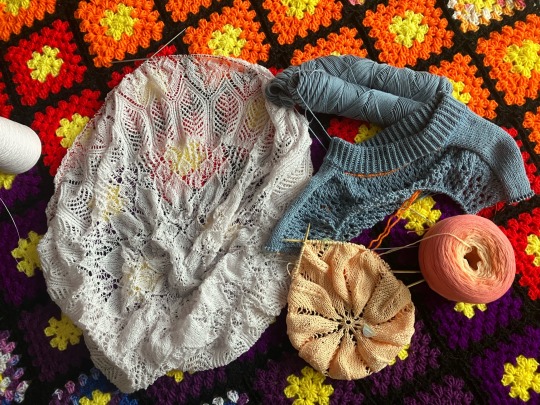
Been busy enough to justify a full round up for this WIP Wednesday. The TL;DR being that I'm back to being fully lace brained.

Blanket 10 is NEARLY finished. I've started attaching the last row and just need to finish out this row and then do a border (and give him a good wash, I've owned some of this yarn for years and it smells a little dusty). The nights are starting to get really cold here so I'll be happy to have it done, I just gotta force myself to work on it.

Doily 14 (Yarn | Pattern) needs to go on a longer needle but other than that is very fun and cute. I've decided to put it down for a bit to work on the next two projects but I expect when they get boring I'll go back to this. This pattern is surprisingly simple for a Neibling as long as you're prepared for the long pattern rows. Absolutely going to have to break out the washi tape to mark off my rows for the second chart, but the first one has been very easy lace knitting.
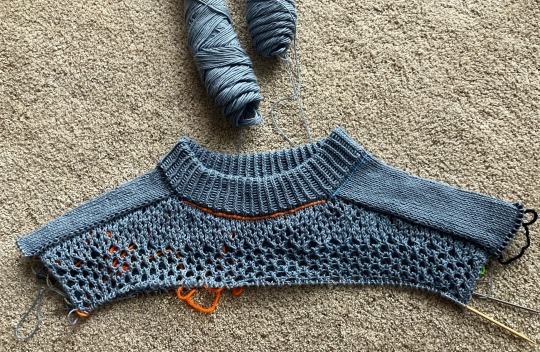
Unnamed project aka me fucking around to see if I can freehand this sweater design. I had started with a two row lace ("Honeycomb lace" from A Second Treasury of Knitting Patterns by Barbara G Walker) but honestly didn't find it fun to knit. So I transitioned to a favourite of mine (ssk, k2tog, yo twice). It's going a lot faster now tho it looks a little weird. I'm going to knit to the underarm and if it fits, it stays. If it's too small I'll rip all the way back and redo the shaping in this lace pattern instead with longer shoulder saddles. It's unfortunate that I didn't like knitting the honeycomb lace, I really like how it looks, I'll have to try swatching it in different yarns to see if the problem is just that this yarn has zero stretch (100% cotton).
I have decided I will put short sleeves on this tho. I had planned to just add ribbing for the arms but I saw a drop shoulder vest in a similar style and did Not like it, so this just saves me from having to rip back. I also think I'm going to have to leave this cropped, I'm not a big crop top person but with this yarn being cotton, having a full length body along with the sleeves is going to have the neckline very stretched. There may be no helping it regardless but there's no harm in trying. I imagine if this is does become something I wear it'll either be in the dead of summer or layered over a button up/some sort of top anyway, so a crop wouldn't be too uncomfortable.
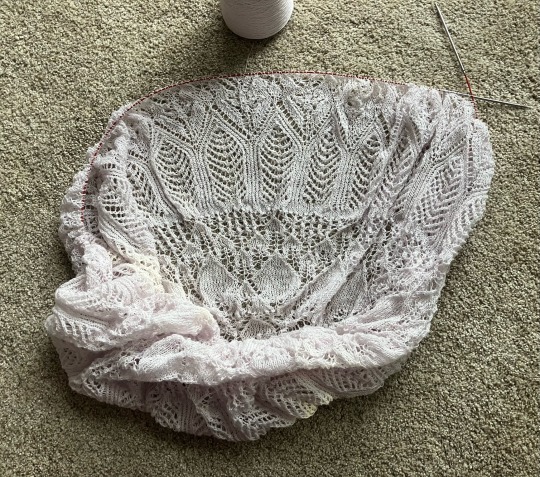
Last but certainly not least is Shawl 14 (Pattern | Yarn). My precious Evenstar is coming along very well, I'm actually on the second to last pattern row before the set up for the border. I know the border is going to be a slog but I'm excited for it regardless, he's huge even all compressed on the needles. My self imposed deadline for him is April, but the border is only 56 repeats. If I can do one every other day I should be right on time, which sounds do-able even tho I know I'll get bored by the halfway point.
I need to keep an eye out for patterns for this yarn, I have a whole second cone plus what'll be left after I finish this shawl. These cones staring at me will probably be the push I need to settle on an Orenburg shawl pattern. (Or possibly a large Neibling, or one of MMario's patterns.)
#knitting#knitblr#lace rot#wip#wip wednesday#project: blanket 10#project: shawl 14#project: doily 14#i haven't really touched shawl 15 so i didn't feel it necessary to include him (also it took me an hour to write up this much anyway)#i'm procrastinating from working on blanket 10 lmao it just makes me so eepy. heavy and warm blanket = nap time.#I gotta find something interesting to listen to while crochet it. I watched Astroid City with my dad and tried to work on it#but got so distracted by the visuals I made like 1 dc every other minute.#also my new cellphone camera is fucking awesome in comparison to my old one holy shit#it's like i just put my glasses on except they're not scratched up for once
48 notes
·
View notes